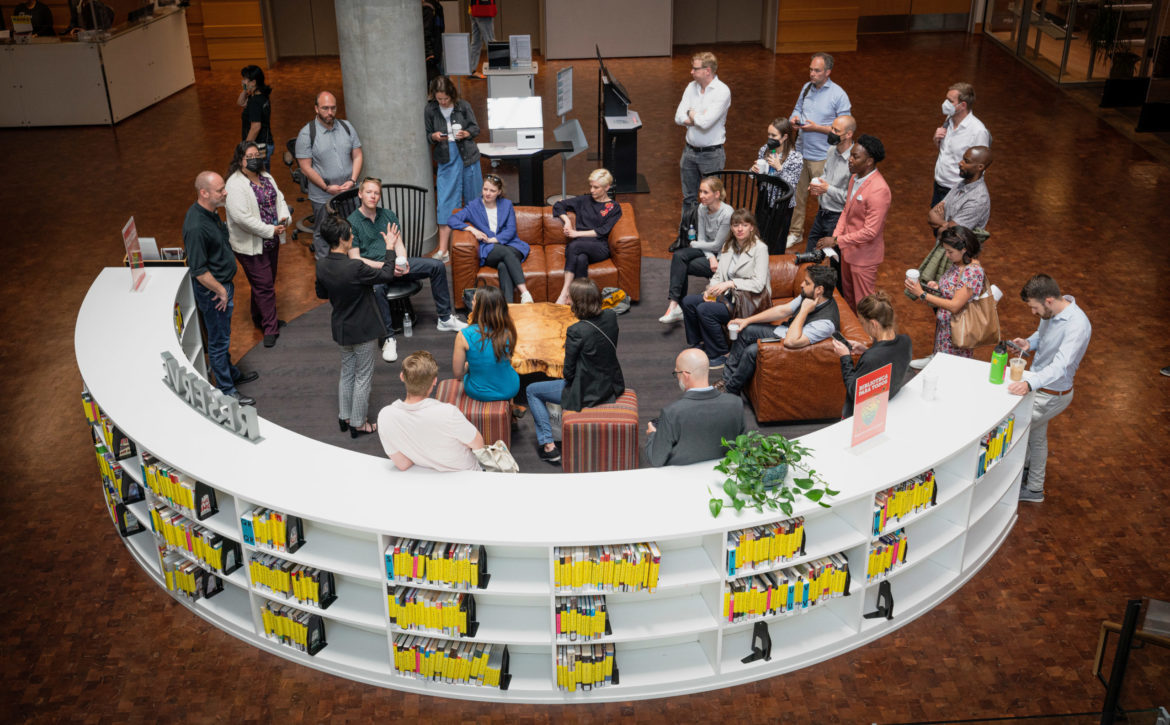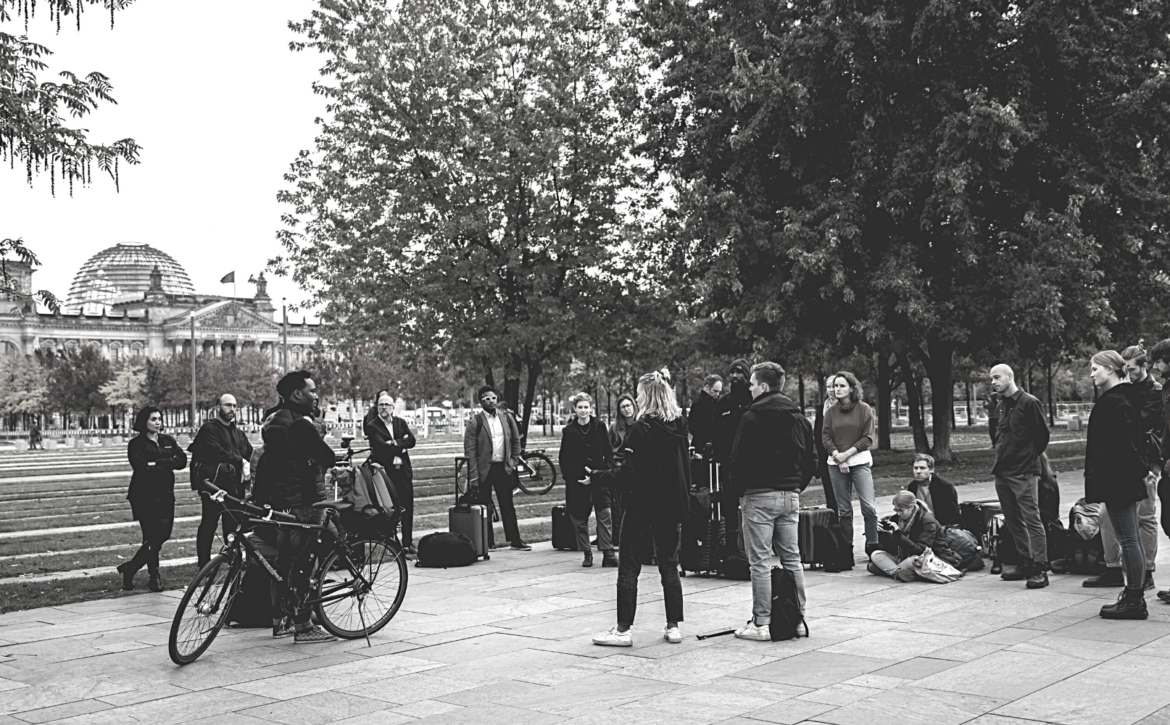Category: News
The NOVA Cities Index: Unlocking Urban Power
The NOVA Cities Index is a tool and framework for cities to live up to their promise of progress. The index’s criteria were chosen based on conversations with urban leaders during trips to Germany and the United States as well as intensive work within the New Urban Progress fellowship. The action paper outlines why these criteria matter and what policies cities must deliver on in order to build urban environments that flourish for all.
The NOVA Cities Index
Leaders internationally have to move faster to address the mounting challenges of climate change, rising inequality, housing insecurity, and health inequity. Over two years, our working group of fellows representing a diverse range of public, private, and civic experiences has studied these issues, speaking with activists, community leaders, elected representatives, and business leaders in cities across Germany and the United States. Our resounding takeaway from our experiences is that there is a shared understanding of our collective challenges, but a severe lack of requisite actions to meet them. Cities release climate equity plans while allowing freeway expansions in urban cores to proceed; they name ambitious emission reduction targets while still zoning single family housing en masse near transit stops. There is an impressive and deep understanding of the challenges facing cities, but there has to be more action.
The lack of action that we have observed is devastating because cities are exactly the actors that can make real, inclusive progress. To support urban leaders, our group assessed the actions necessary to respond to urban challenges and foster inclusive urban progress (considering shared challenges on both sides of the Atlantic). We devised a baseline criteria as guidance to determine whether the progressive visions espoused by many influential urban thinkers have been put into practice. At their best, cities are the life force of our civilization, bustling with an energy that unlocks the highest form of human collaboration and flourishing. The brightness of their potential is a ‘supernova’ (a powerful and luminous stellar explosion) for society, thus, we are excited to introduce the NOVA Cities Index: a blueprint for inNOVAtive cities.
The NOVA Index Criteria
1. Housing Affordability – In a Nova City, 80% of population is not rent burdened.
2. Land Use & Transportation – A Nova City is compact and dense.
3. Inclusive Innovation & Workforce Development – A Nova City invests in the success of its citizens, attracts talent, and fosters local entrepreneurs/economic development.
4. Open Data – A Nova City prioritizes transparency and commits to creating a single central open data portal for its city and making 100% of its data available.
5. Digital Equality – A Nova City provides digital infrastructure to at least 75% of its population and is working towards 100% within 5 years.
Read the the entire action paper for how these criteria were chosen and why they matter.
What's Next for the Index?
The index is ready to be put to the test! It was first discussed and debated at the Progressive Governance Summit 2022 at the session on urban power – watch the presentation and debate here.
The index will be pitched to city offices around Germany and the United States. We hope to engage with a growing group of urban leaders and generate productive conversations in the United States and Germany on how cities can continue to be places that deliver progress.
Authors of the NOVA Cities Index
- Andrea Jonas is Project Manager for international urban development at the German Federal Institute for Research on Building, Urban Affairs and Spatial Developement (BBSR).
- Ian Lundy is Impact Investor at MSquared
- Jamaal Glenn is Director at Schmidt Futures and Adjunct Professor at New York University.
- Marc Lendermann is Economic Counselor for the German Consulate General San Francisco.
- Maria Willett is Chief of Staff at the City of Rochester Hills, Michigan.
- Richard Lawrence Jr. is Principal Planner at the City of Alexandria, Virginia.
- Victoria Boeck is Research Associate for open data at the Technologiestiftung Berlin.

The project is supported by the Transatlantic Program of the Federal Republic of Germany and funded by the European Recovery Program (ERP) of the Federal Ministry for Economic Affairs and Climate Action (BMWK).
Recap: NUP Fellows Travel Across the United States
Our Second New Urban Progress Trip Took Our Fellows to Chicago, Denver and Austin
Our New Urban Progress fellows travelled within the United States to explore how cities can provide examples, best practices, and solutions on how urban areas can serve as primary actors against global crises. During their visits to Chicago, Denver, and Austin, our fellows learned from experts at the local governmental, institutional, and community levels about how they approach everything from eroding trust in democracy to the climate crisis from different urban standpoints. This tour was the second of two delegation trips, after visiting Germany last fall. You can find a recap of 2021’s visit to Berlin, Leipzig, and the Ruhr Valley here.
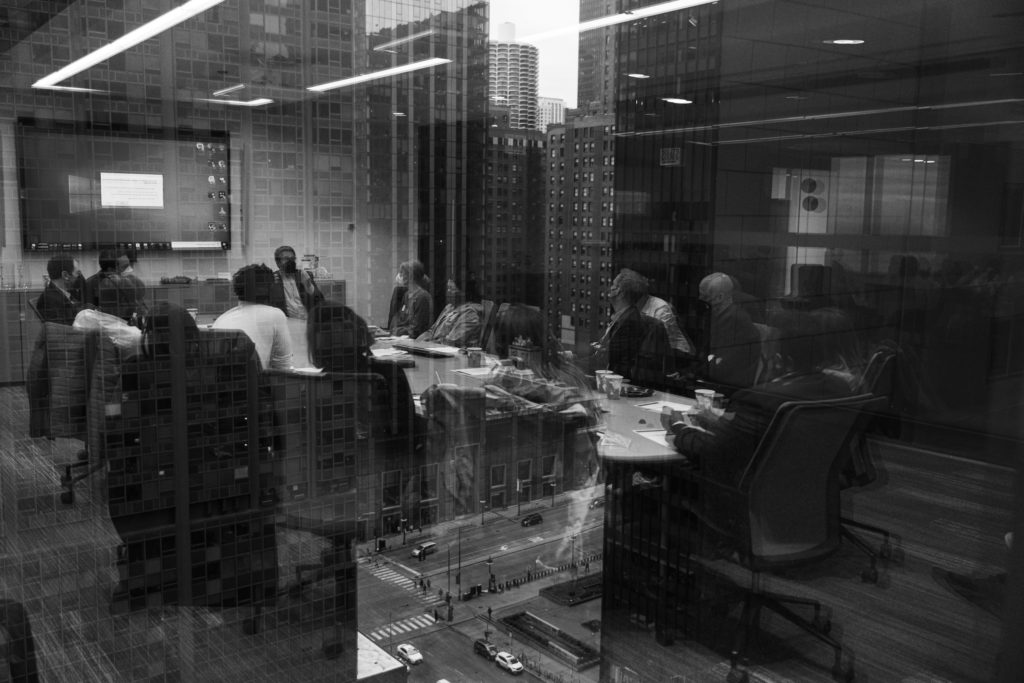
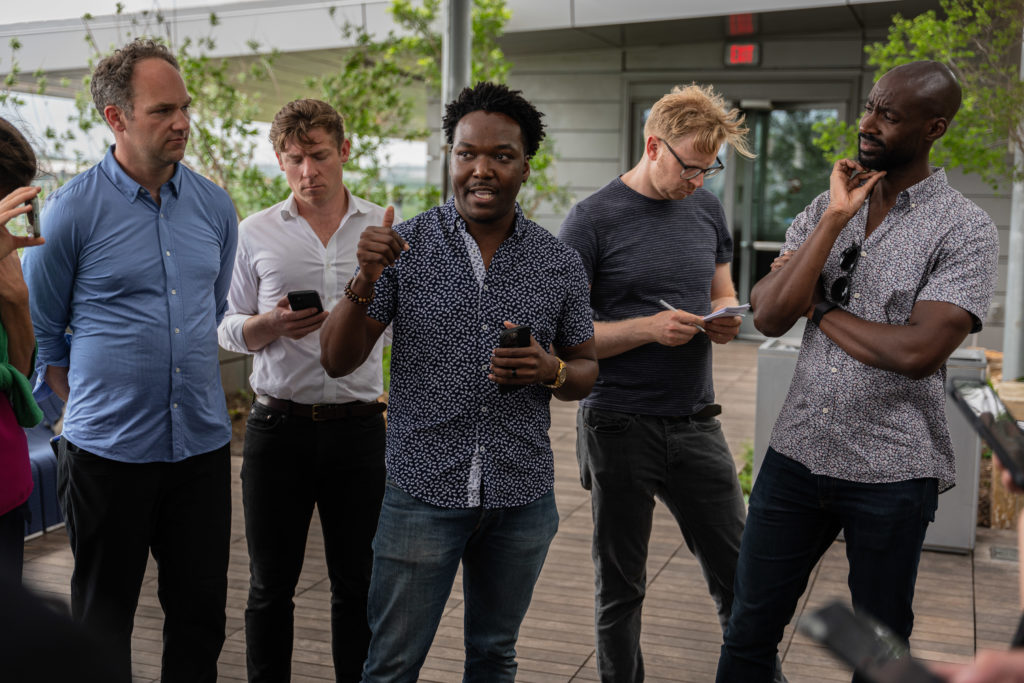

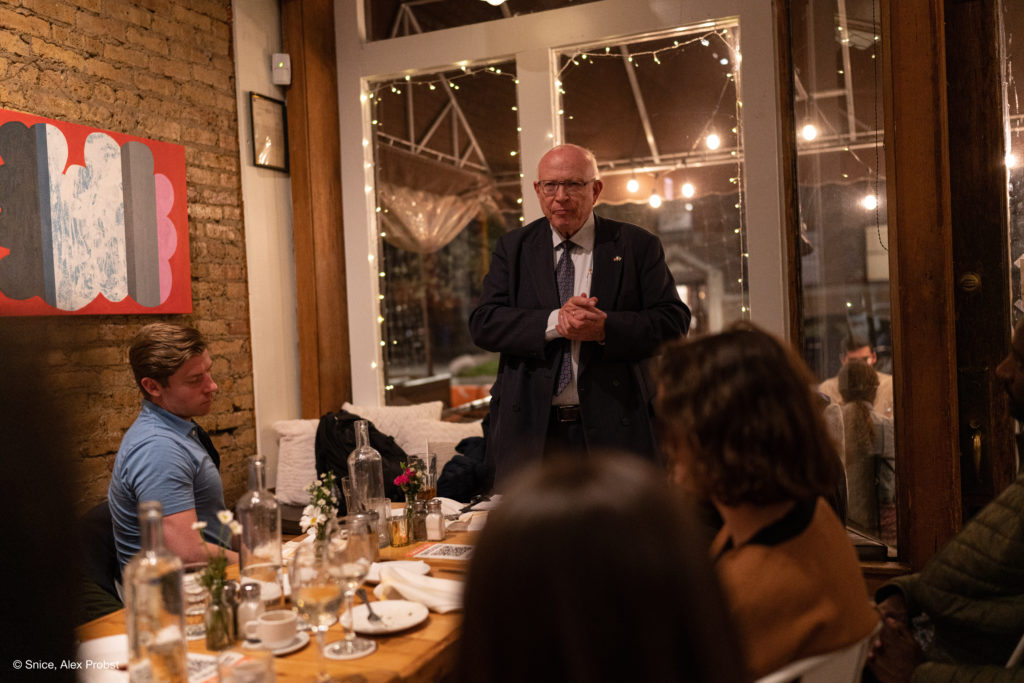
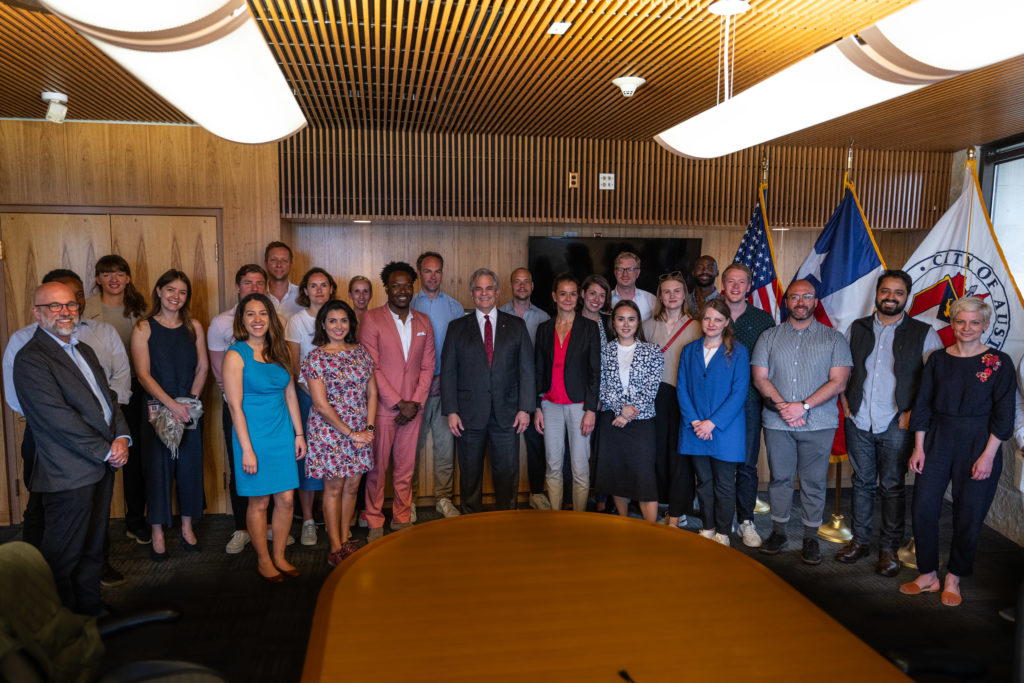
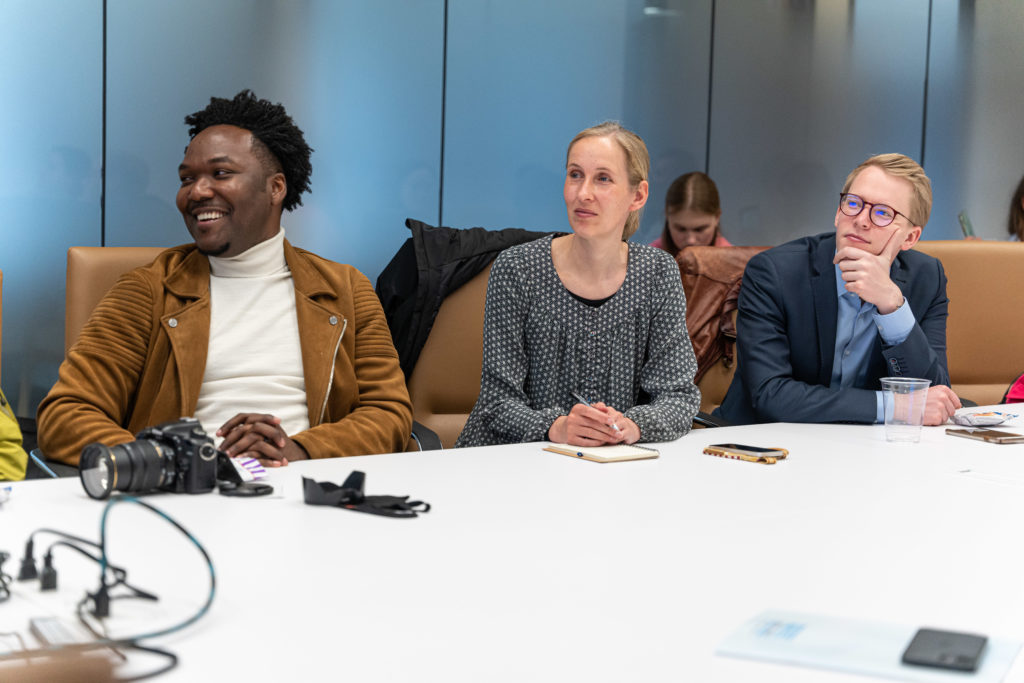
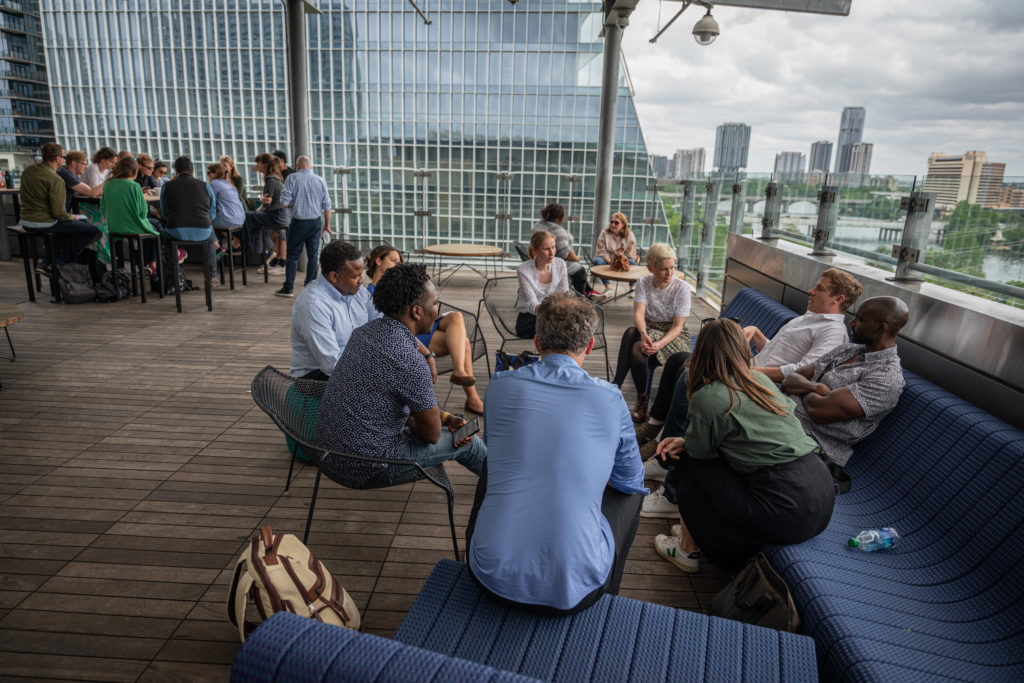
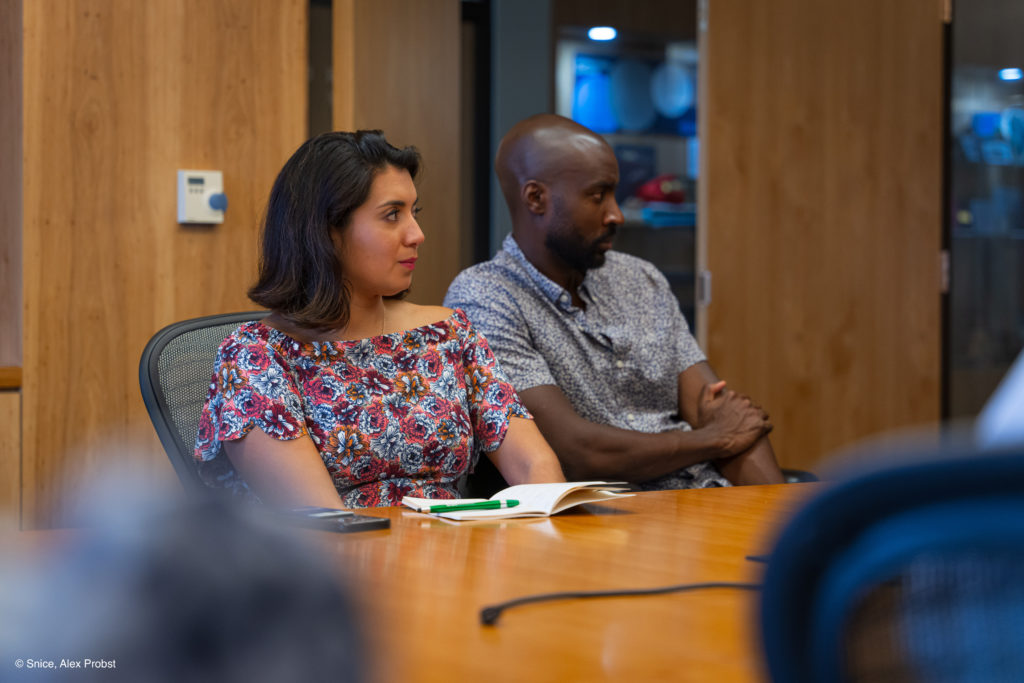

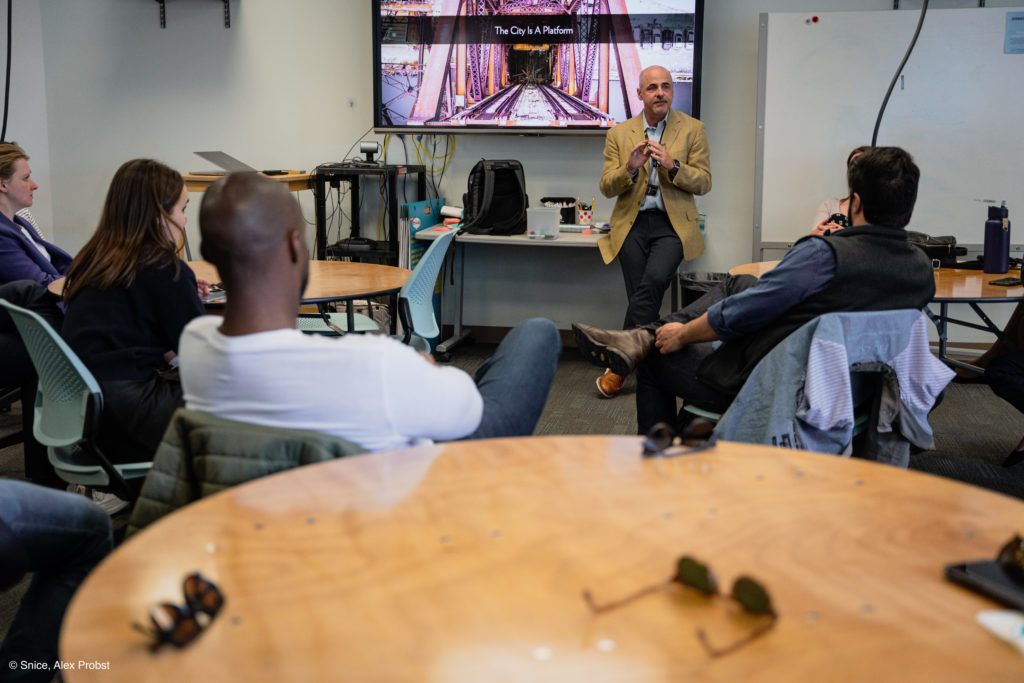
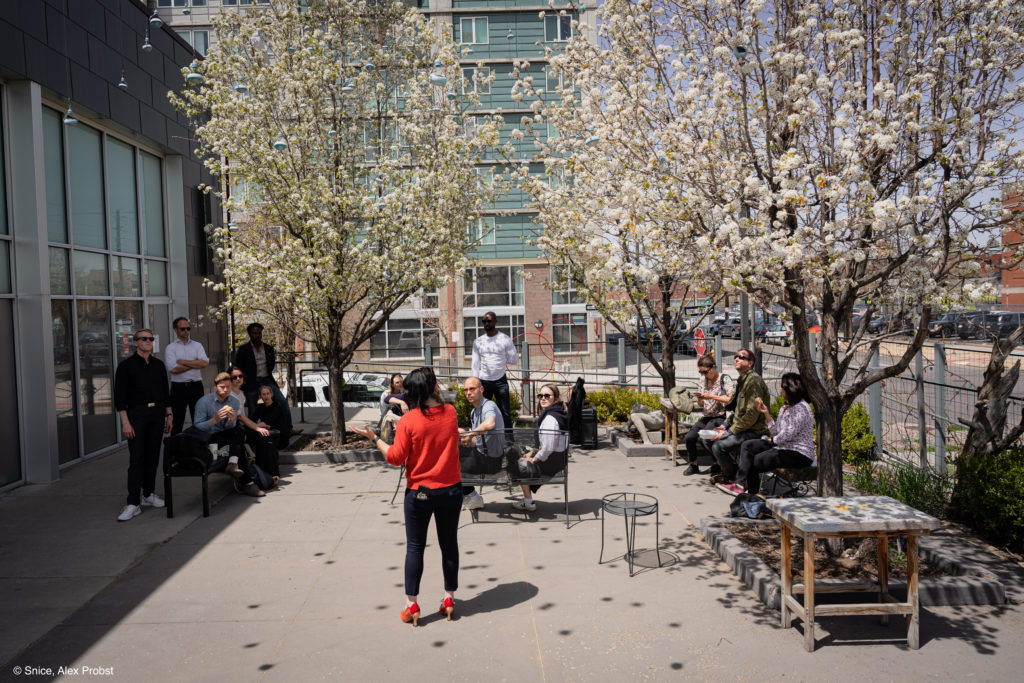
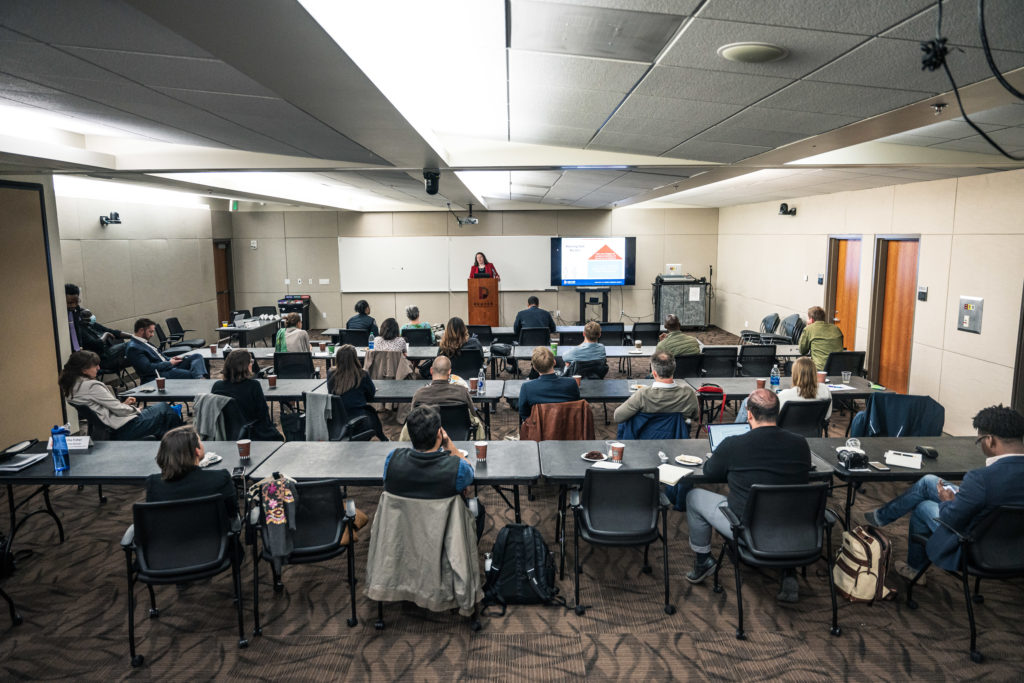
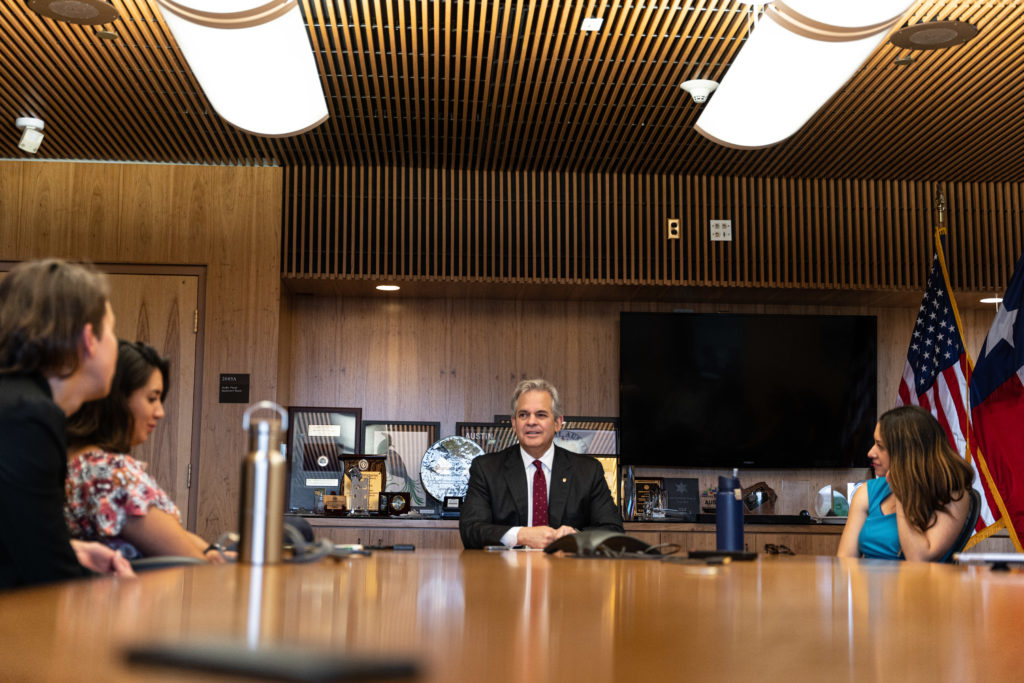
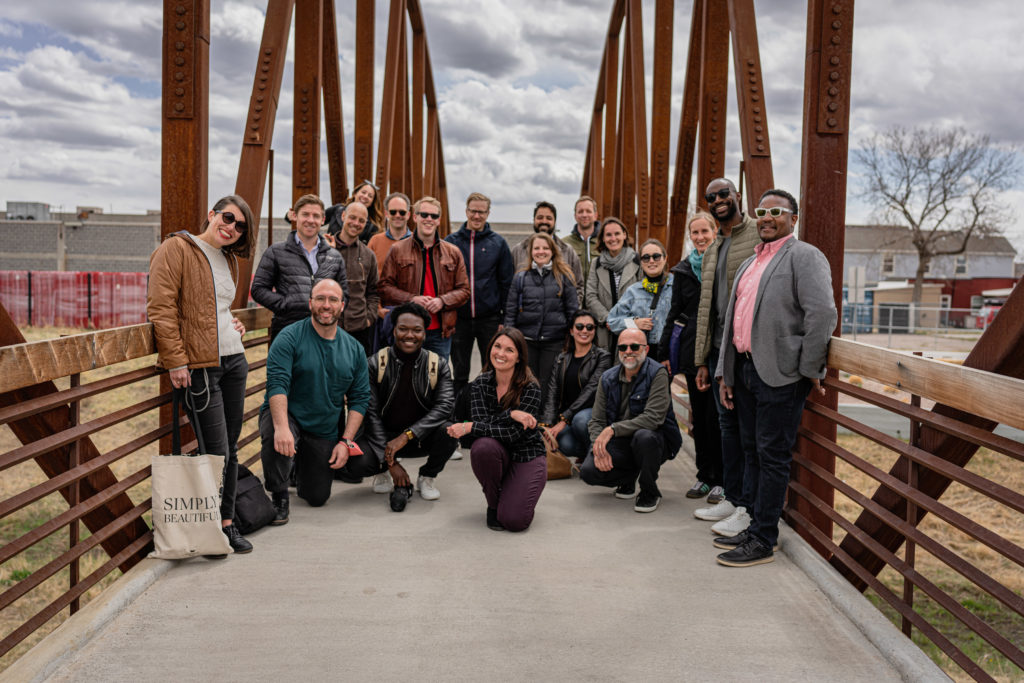
Rewatch the Highlights
Our Trip: A Week Across the United States
The first stop brought our fellows to the financial and cultural hub of the Midwest: Chicago. Our fellows explored Chicago’s role as a leading example for democratic, sustainable, and innovative urban development. The delegation kicked off their tour with several meetings with high-ranking city officials, professionals, and institutions.
 Meeting Chicago’s Deputy Mayor
Meeting Chicago’s Deputy Mayor
During their meetings with Chicago’s mayor’s office, our fellows had the opportunity to engage in a lively discussion with Deputy Mayor for Economics and Neighborhood Development, Samir Mayekar. The core topic of debate was how the City of Chicago encourages innovation and growth that is inclusive and does not leave historically excluded communities behind. How can Chicago continue to be a regional, national and international leader but also bring equity to all their communities? As Chicago faces an increasing wealth gap, racial economic inequality, skyrocketing living expenses, and all against a backdrop of the threats of climate change: What steps is Chicago taking to counter these and other challenges directly?
Chicago Council on Global Affairs
How – and why – should cities be global actors? The delegation sat down with city experts to discuss this question and more. The fellows learned about the research and publications that the Chicago Council on Global Affairs has done on the subject and left with fundamental approaches to continue working on what it means to be a transatlantic city.
World Business Chicago
The delegation met with the Executive Vice President of Innovation and Venture Strategy, Abin Kuriakose to discuss the innovation ecosystem of Chicago and how it differs from other major cities. The conversation also centered on how economic growth can be inclusive and beneficial to all residents of Chicago.
After Friday’s meetings with city actors and political researchers and institutions, our fellows had the opportunity to meet with local communities and transatlantic actors on their second day in the Windy City.
Progressive Actors on the Ground
 While touring the Chicago Lakeview neighborhood, our fellows learned about the role of local businesses, community actors, and the chamber of commerce in ensuring equitable local development in the city. The afternoon walking tour took the delegation through several neighborhoods, the economic core, a lakeside park, and the historic baseball stadium Wrigley Field. Along the way, urban planner Adam Rosa from COLLABO, the Chief of Staff of the local Alderman, and Maureen Martino the Executive Director of the Lakeview Chamber of Commerce gave concrete examples of how different actors in the community work together on creating a more democratic and equitable community to live in.
While touring the Chicago Lakeview neighborhood, our fellows learned about the role of local businesses, community actors, and the chamber of commerce in ensuring equitable local development in the city. The afternoon walking tour took the delegation through several neighborhoods, the economic core, a lakeside park, and the historic baseball stadium Wrigley Field. Along the way, urban planner Adam Rosa from COLLABO, the Chief of Staff of the local Alderman, and Maureen Martino the Executive Director of the Lakeview Chamber of Commerce gave concrete examples of how different actors in the community work together on creating a more democratic and equitable community to live in.
Round Two of Transatlantic Conversations

After last year’s successful transatlantic gathering in Berlin, our fellows partook again in a transatlantic evening in Chicago. During the dinner, German Consul General to the United States, Wolfgang Mössinger, spoke of the importance of the democratic and equitable cities providing the foundation for a stronger transatlantic relationship grounded in shared values.
Shared visions are a core pillar of transatlantic collaboration. Our fellows learned about the development at an airport on Northerly Island, which provided another example of shared transatlantic ideas.
Mueller Central Neighborhood Project
 How cities reutilize urban spaces has become a topic of debate across the Atlantic. During last year’s tour through Germany, our fellows discovered the democratically revitalized Tempelhofer Feld in Berlin, a former airport that was shut down permanently in 2008. Now one of the largest green spaces in an urban setting, the area offers opportunities for community projects and gardens, social gatherings, and recreational activities. In Chicago, our fellows learned about a similar project commissioned by the Chicago Park District. During their meeting at the Smith Group, our fellows learned about the redevelopment plans of a former airport on Northerly Island into a park and community gathering space. Equipped with a 50-acre freshwater lagoon, woodlands, and public meeting spaces, the park in progress demonstrates the potential of shared transatlantic strategies.
How cities reutilize urban spaces has become a topic of debate across the Atlantic. During last year’s tour through Germany, our fellows discovered the democratically revitalized Tempelhofer Feld in Berlin, a former airport that was shut down permanently in 2008. Now one of the largest green spaces in an urban setting, the area offers opportunities for community projects and gardens, social gatherings, and recreational activities. In Chicago, our fellows learned about a similar project commissioned by the Chicago Park District. During their meeting at the Smith Group, our fellows learned about the redevelopment plans of a former airport on Northerly Island into a park and community gathering space. Equipped with a 50-acre freshwater lagoon, woodlands, and public meeting spaces, the park in progress demonstrates the potential of shared transatlantic strategies.
Both projects in Berlin and Chicago emphasize the importance of democratic processes and public engagement during their drafting and implementation phases and are examples of successful sustainable, democratic, and innovative urban development.
After a long weekend in Chicago, our fellows flew to Denver, Colorado, to visit their second city on their delegation tour through the United States. Denver’s metro area nearly doubled its population in the last 30 years, bringing economic growth but also rising living expenses to its inhabitants. Our fellows met on their first day with city officials and community organizations dedicated to creating safe outdoor living spaces.
Sustainability as the Basis for Long-Lasting Urban Development
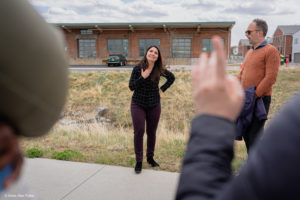
During their meeting with Cinceré Eades from Denver Parks & Rec, our fellows discussed the city’s climate adaptation and mitigation policies. As the city increasingly faces droughts, flash floods, wildfires, and other climate change-related threats, Denver has adopted various strategies to mitigate the climate’s impact on the population. Ms. Eades named the Stormwater Improvement Project as an example, which aims at preventing recurring flooding of open spaces that could otherwise serve as recreational areas. Securing urban spaces and re-utilizing them for public benefit is a core element in pursuing an urban development beneficial to all inhabitants.
Housing Hour
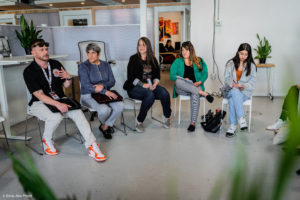
Our fellows spoke to four organizations that focus on short and long-term relief to Denverites experiencing homelessness and housing in general. The experts emphasized the importance of community engagement, networked-based community organizations, while putting lived-experience at the core of decision making, in order to create visible change in the housing crisis. Innovative solutions brought forth e.g. from the Colorado Village Collaborative, are the construction of tiny houses to bridge the living experiences from the streets to more stable housing. The core question during their talks was whether and how cities prepared for rising living expenses in times of drastic population and economic growth? While the city supports these efforts generally, our speakers pointed to the constant shortcomings of land and financial resources.
On their second day in Denver, our fellows had the opportunity to speak to officials from the mayor’s office and researchers at the University of Denver on the future urban development of Denver.
City of Denver
The City of Denver employs 13,000 workers. The delegation meet with a handful of them, including from the public safety, immigration and refugee affairs, art and culture, and housing departments. The interactive meeting gave us an inside look of how the Mile High City works towards its goals of making Denver more inclusive and equitable for all its residents.
Smart Cities
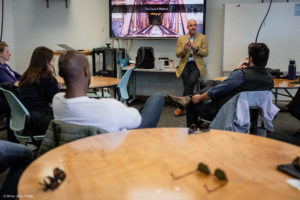 During their meeting with John Tolva and Meghan White from Colorado Smart Cities Alliances, our fellows discussed the purpose and potential of smart cities in the state of Colorado. Mr. Tolva spoke of the potential of “smart cities” in making cities more equitable during their expansion processes”, highlighting their goal to improve the quality of life beyond tech through economic development and collaborative ecosystems. Also, they discussed how Colorado as a region could work together to share best practices and technologies for a wider impact across the state.
During their meeting with John Tolva and Meghan White from Colorado Smart Cities Alliances, our fellows discussed the purpose and potential of smart cities in the state of Colorado. Mr. Tolva spoke of the potential of “smart cities” in making cities more equitable during their expansion processes”, highlighting their goal to improve the quality of life beyond tech through economic development and collaborative ecosystems. Also, they discussed how Colorado as a region could work together to share best practices and technologies for a wider impact across the state.
Our fellows traveled to Boulder, Colorado, for their final day in the Centennial State to discuss climate policies with Boulder sustainability officers.
Small City with Big Ambitions
 During their meeting with various sustainability from Boulder, our fellows learned how the city punches above its weight when it comes to climate policies at the national and international level by experimenting with policy and impactful collaboration. The delegation heard a group which included, the former Colorado State Assembly Majority Leader, a lawyer working for the Environmental Protection Agency, the former Mayor of Boulder, Boulder’s Chief Sustainability Officer, as well as an energy policy expert. For our experts, cities – and especially Boulder – are where much of the meaningful work towards a just transition and environmentally-friendly future first takes place. The question is how it can then be scaled up and out. Our speakers also discussed how coupling climate policies to economic security can make progressive energy policies more tangible to the public, also in more rural areas as they begin to face the consequences of climate change first hand.
During their meeting with various sustainability from Boulder, our fellows learned how the city punches above its weight when it comes to climate policies at the national and international level by experimenting with policy and impactful collaboration. The delegation heard a group which included, the former Colorado State Assembly Majority Leader, a lawyer working for the Environmental Protection Agency, the former Mayor of Boulder, Boulder’s Chief Sustainability Officer, as well as an energy policy expert. For our experts, cities – and especially Boulder – are where much of the meaningful work towards a just transition and environmentally-friendly future first takes place. The question is how it can then be scaled up and out. Our speakers also discussed how coupling climate policies to economic security can make progressive energy policies more tangible to the public, also in more rural areas as they begin to face the consequences of climate change first hand.
The Importance of Accessible Green Spaces for Public Health
 During their hike in the outskirts of the City of Boulder, our fellows personally experienced the benefits of wide green spaces in the urban vicinity. The importance of equal access to green areas is a point often referenced in city climate action plans (such as Chicago’s), as clean air and various other health benefits go hand-in-hand with the proximity to parks.
During their hike in the outskirts of the City of Boulder, our fellows personally experienced the benefits of wide green spaces in the urban vicinity. The importance of equal access to green areas is a point often referenced in city climate action plans (such as Chicago’s), as clean air and various other health benefits go hand-in-hand with the proximity to parks.
After traveling from Denver to Austin for their final stop on the NUP delegation tour, our fellows kicked off their visit with an audience at the mayor’s office.
 Meeting Mayor Adler
Meeting Mayor Adler
Through its C40 network and other collaborations, Austin aims to share best practices with other mayors and contribute to ambitious climate policies internationally. Mayor Adler spoke of the need to manage population growth rather than encouraging it – for Adler you give 100% effort in managing growth, compared to 0% effort in encouraging it. As the city currently records nearly 160 new people per day and property value jumped from $350,000 to $650,000 in the last two years alone, he emphasized the responsibility to ensure access to basic services and affordable housing. Regarding democratic participation, Mayor Adler spoke of making democratic platforms, such as town hall meetings, more flexible and accessible to community members. A Democratic bastion on a highly Republican state, our meeting with Mayor Adler offered invaluable insight into how a city can pursue and implement progressive energy, housing, and innovative policies despite conservative state directives.
Black Austin Tour
During their first afternoon, the delegation went on a tour of Austin’s historic black neighborhood to understand the historic inequalities and their influences on current politics in the city. Led by a neighborhood local, the delegation learned about prominent Black community leaders, visited several museums and discussed how different communities have contributed to the richness of the neighborhood.
On their final day in Austin, our fellows had the opportunity to observe yet again another example of transatlantic visions and continue to explore Austin’s climate strategy.
Transatlantic Visions of Urban Spaces

Democratically transforming a former airport in Austin into living and recreational areas – sound familiar?
After visiting Tempelhofer Feld in Berlin and Northerly Island in Chicago, our delegation continued to learn about innovative ways the grounds and buildings of former airports can be re-invented for community spaces, affordable housing, and green areas in urban settings. The Mueller plan to redevelop the former Robert Mueller Municipal Airport site in Austin focuses on ensuring diverse, affordable, and sustainable housing. While inspirational, our guides also discussed city legislation that prevents similar developments in other parts of Austin.
Rethink35
The group met with activists from Rethink35, who are advocating for stopping the current freeway expansion of the the I-35, which goes directly through the city and has historically segregated Austin. They gave their takes on how they work in networks with other groups and how they are trying to gain more support at City Hall for their cause.
Democratizing Policy-Making
Our fellows also discussed democratic engagement in city policies by the example of the Austin Climate Equity Plan, which was adopted by the city council in 2021. The plan’s goal is to equitably reach net-zero community-wide greenhouse gas emissions by 2040. During the drafting process, special emphasis was laid on engaging with racially and economically diverse residents about the challenges, barriers, and opportunities facing historically excluded groups. This policy serves as a prime example of how community actors can be included and contribute to forming policies impacting their living spaces directly.
 Going home with new ideas
Going home with new ideas
After nine long days of traveling through the United States and visiting three cities, our fellows concluded the second New Urban Progress delegation tour on Saturday. Reflecting on the meetings and people they were able to meet, discuss with, and learn from, our fellows will now begin the next phase of the project and finalize their three papers on how cities can become key actors in the fight against global challenges.
After visiting cities in the US and Germany, our fellows will come together in their working groups to prepare the final papers for the paper launch in July. Stay tuned for more information about their discoveries on how urban spaces can shape progressive politics
New Urban Progress is the joint metro initiative of Das Progressive Zentrum, the Alfred Herrhausen Gesellschaft and the Progressive Policy Institute. The project was supported by the Transatlantic Program of the Federal Republic of Germany, funded by the European Recovery Program (ERP) of the Federal Ministry for Economic Affairs and Climate Action (BMWK).
New Urban Progress visits the United States
Our second New Urban Progress delegation trip will take our fellows to Chicago, Denver, and Austin
After last year’s delegation tour through Germany, our New Urban Progress fellows will now visit the United States. The three urban areas they will explore are Chicago, Denver, and Austin, where they will meet with city officials, urban planners, civic leaders, and entrepreneurs and continue to work on how cities can be more innovative, democratic, and sustainable.
Make sure to watch our interview with Deputy Mayor Ulrich Hörning during last year’s visit to Leipzig.
Stay updated on our trip by visiting our website, social media and signing up to our newsletter here.
First stop: Chicago (April 22 – 24)
The first stop of our New Urban Progress (NUP) delegation tour through the United States offered exciting insight into the urban planning of such a metropolis as Chicago. Not only were there numerous parallels to German urban development, but our speakers and hosts also emphasized the potential for a continued transatlantic urban cooperation.
From Chicago’s city government over institutions researching the role of cities globally to the importance of communities on the grassroots level, our fellows learned a diverse set of perspectives and experiences on how individual actors and institutions approach global issues from an urban standpoint. Their meetings with Deputy Mayor Samir Mayekar, the Chicago Council on Global Affairs, and their tour through the Chicago Lakeview neighborhood provided the fellows with different approaches and insight into the work of urban actors at various levels.
The Windy City also complemented our fellows’ experiences during their delegation tour through Germany. For example, the Northerly Island project, commissioned by the Chicago Park District, aims at transforming a former airport into a park. Equipped with a 50-acre freshwater lagoon, woodlands, and public meeting spaces, the park in progress resembles the Tempelhofer Feld, also a former airport in the heart of Berlin and visited by our fellows last year. Now one of the largest green spaces in an urban setting, the Tempelhofer Feld offers opportunities for community projects, public gardens, social gatherings, and recreational activities. Both projects emphasize the importance of democratic processes and public engagement in pursuing sustainable, democratic, and innovative urban development.
Chicago, as one of the largest metropolitan areas in the United States, offered our fellows valuable lessons on how to make a city adapt to the effects of climate change and how to make urban development equitable and beneficial for all citizens.
Find below a selection of our impressions in Chicago over the weekend and stay tuned for our next NUP visit: Denver, CO.
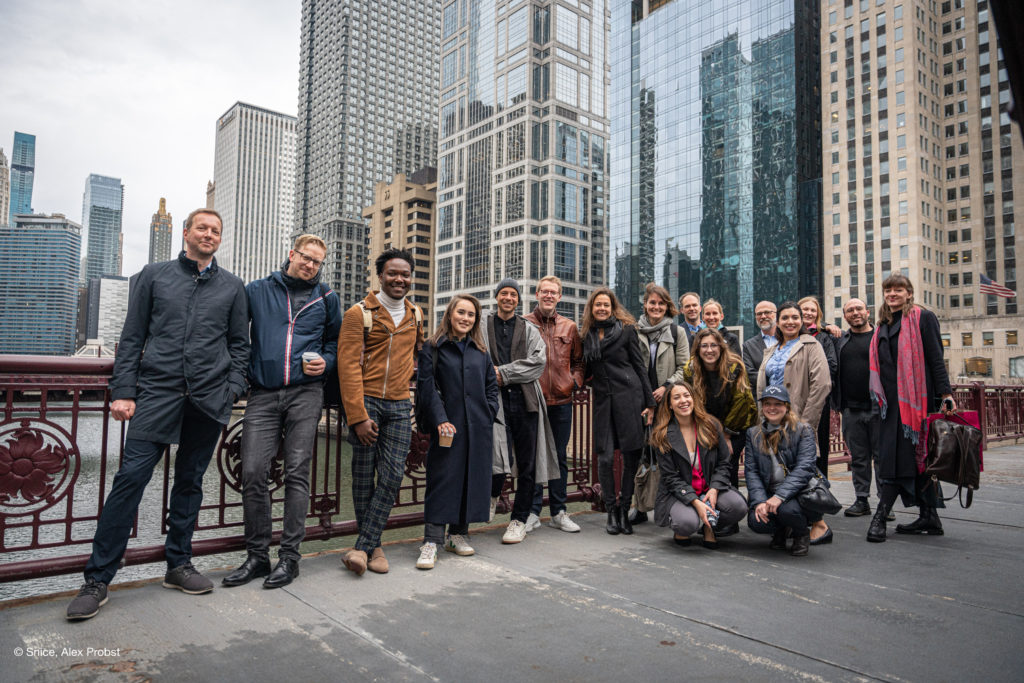
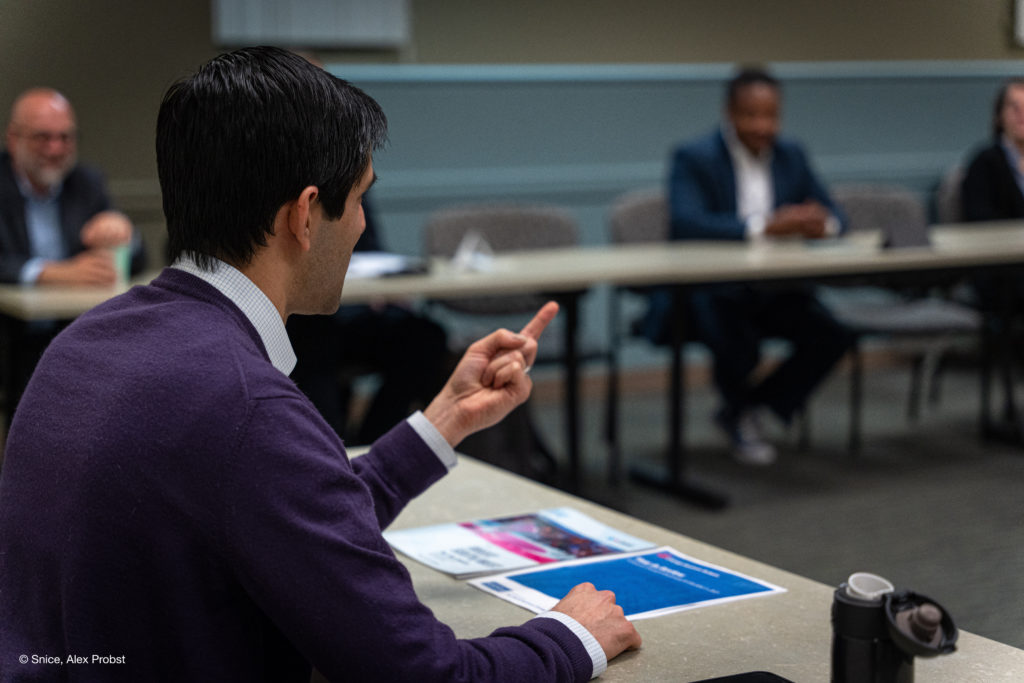
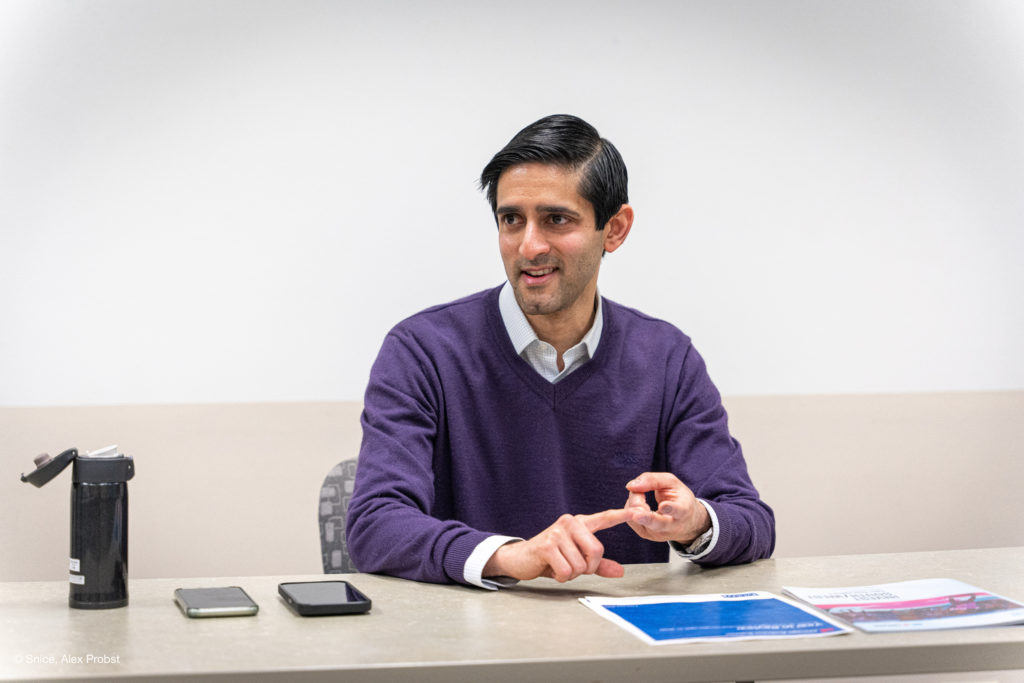
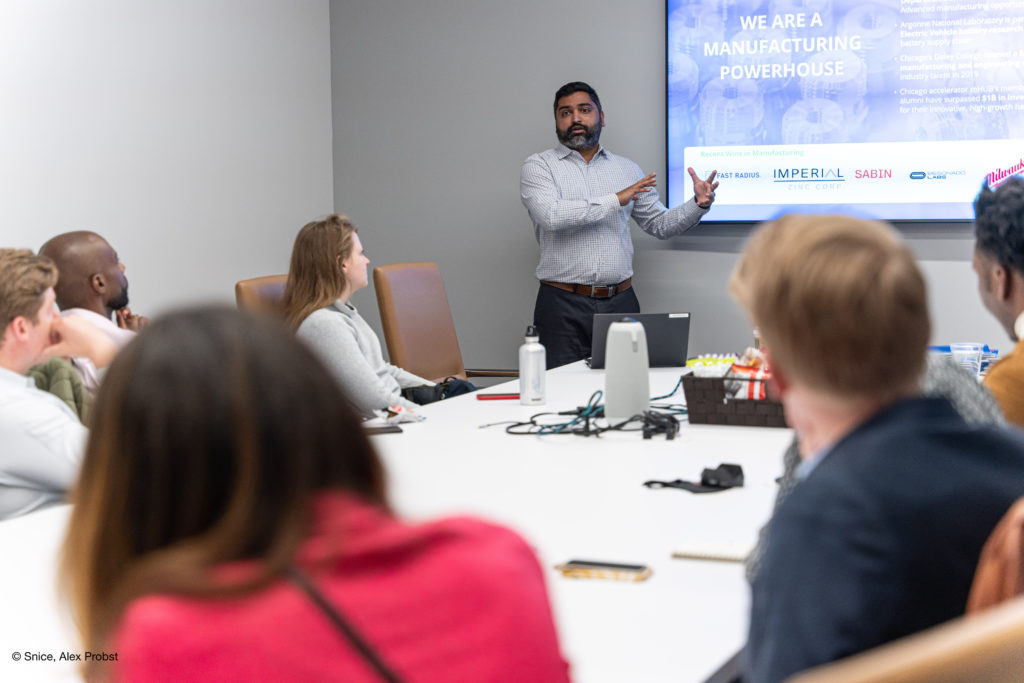
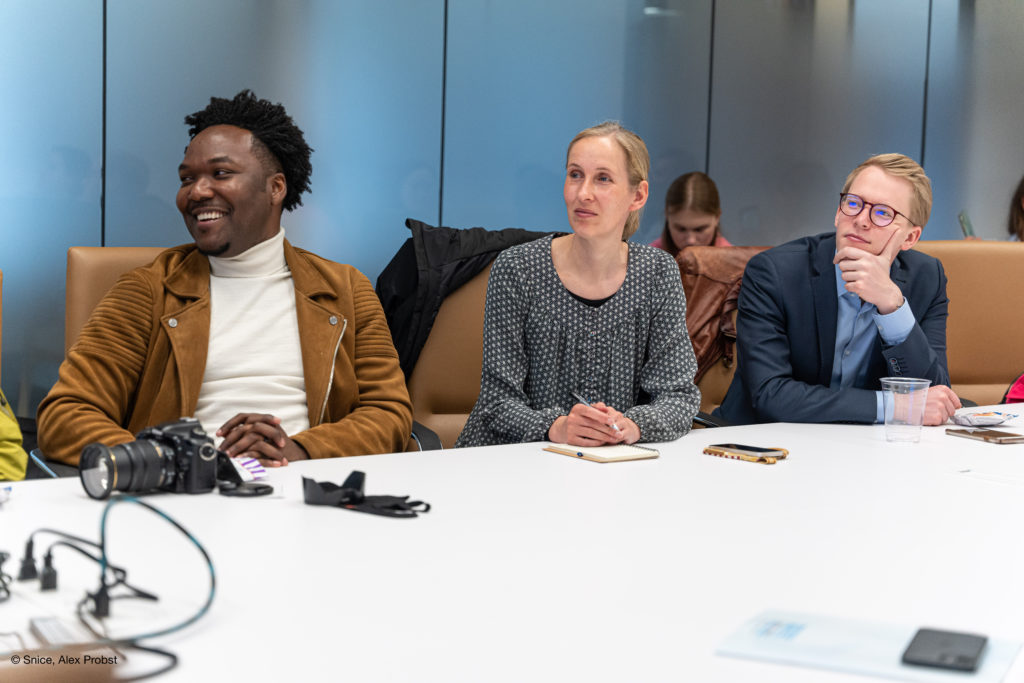
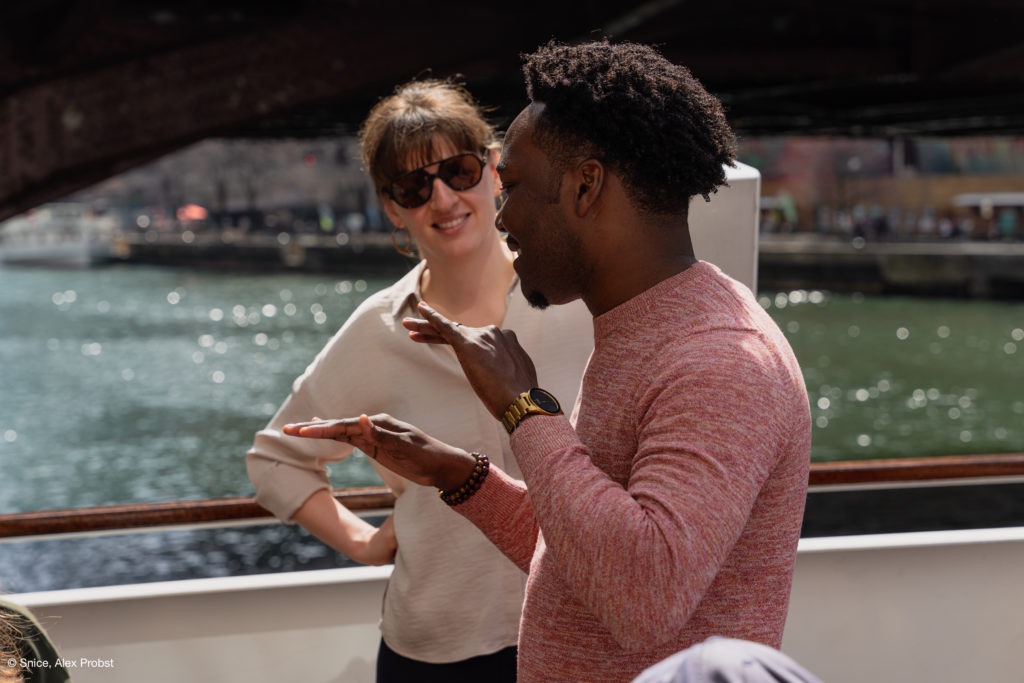
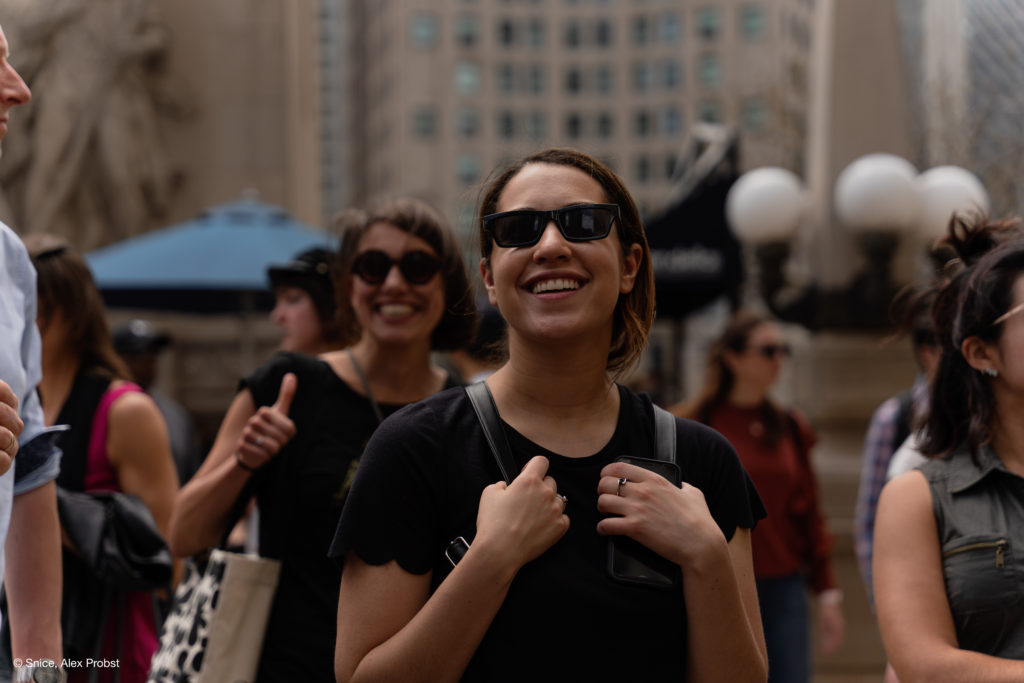
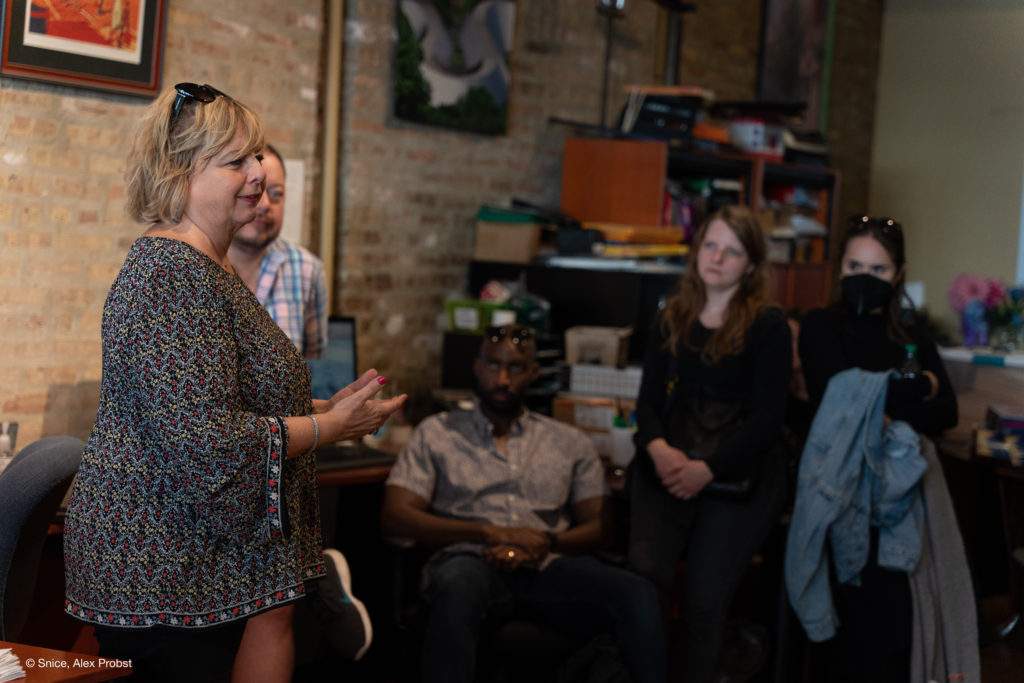

Second stop: Denver (April 24 – 27)
The second stop of our New Urban Progress (NUP) delegation tour through the United States brought our fellows to Denver, Colorado. As the Denver metropolitan area nearly doubled its population in the past 30 years, the local government had to learn how to address housing challenges and other related issues against the backdrop of climate change impacting the city’s infrastructure. Our fellows met with various actors on the governmental and civic levels who approach the challenges of rising housing prices, living expenses, and the effects of climate change from a diverse set of viewpoints.
During their meeting with Colorado Smart Cities Alliance, our fellows learned how innovation makes cities more equitable through economic development and collaborative ecosystems. On the issue of housing insecurity, various community organizations also shared insight on how they create safer outdoor spaces for people experiencing homelessness and provide short-term emergency relief in the Denver metro area. Regarding climate change, our fellows spoke with various Denver and Boulder city officials who informed our fellows about initiatives and projects both cities are taking to mitigate and adapt to the impact of climate change. Their talk with sustainability officers from Boulder offered answers on how to measure, communicate, and best address the urgency of climate policies to the public, for example, by coupling policies to economic security to make progressive energy policies more tangible to the public.
Find below a selection of our fellows’ impressions in Denver and Boulder, Colorado last week.

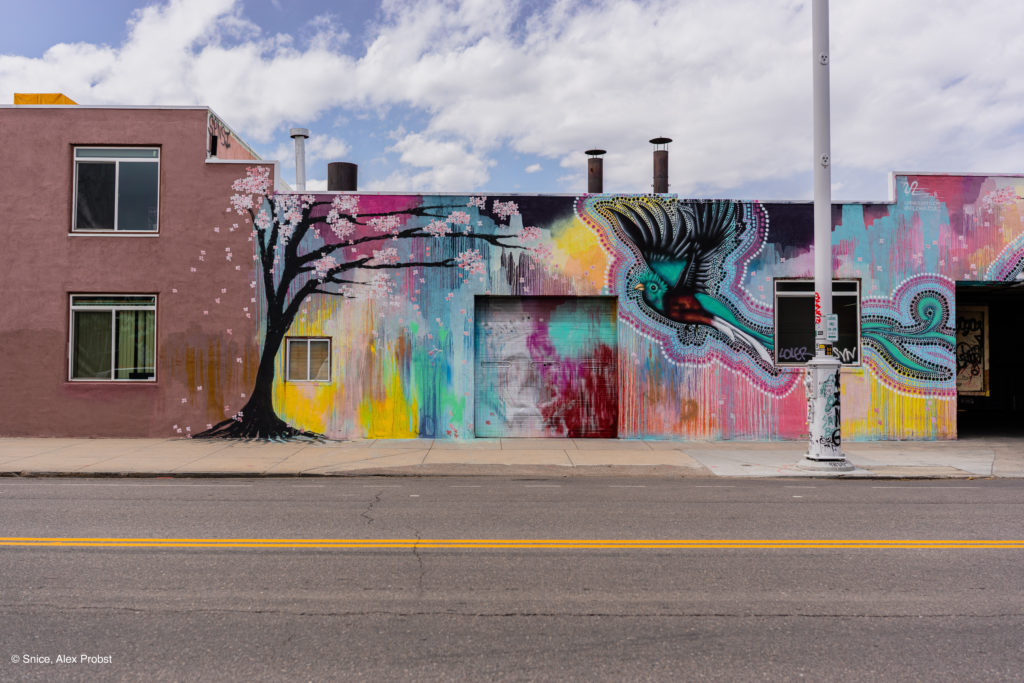
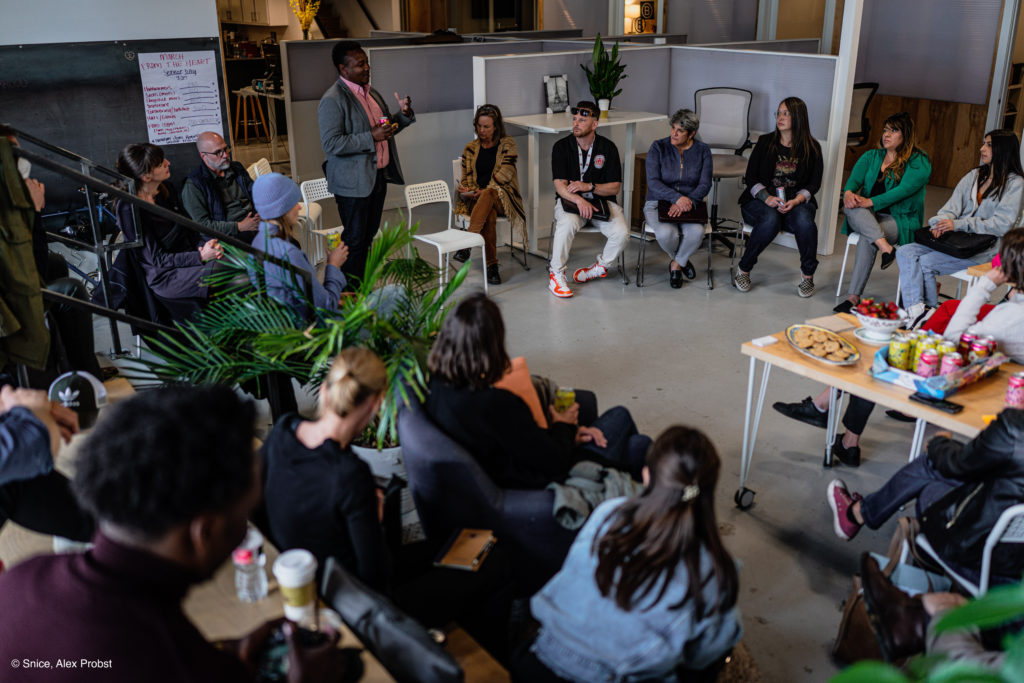
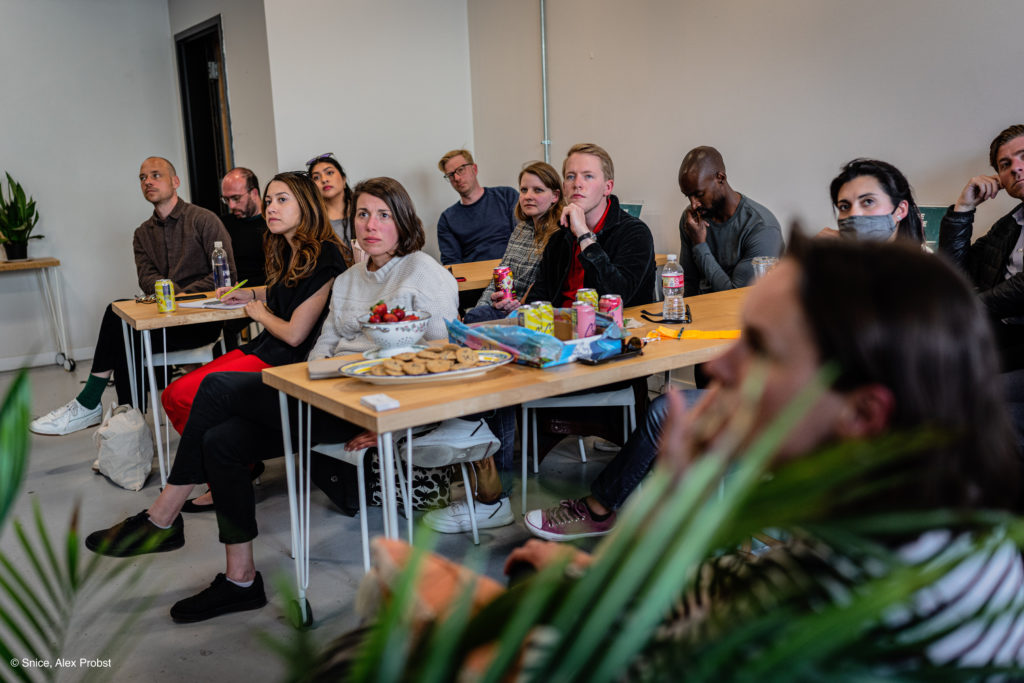
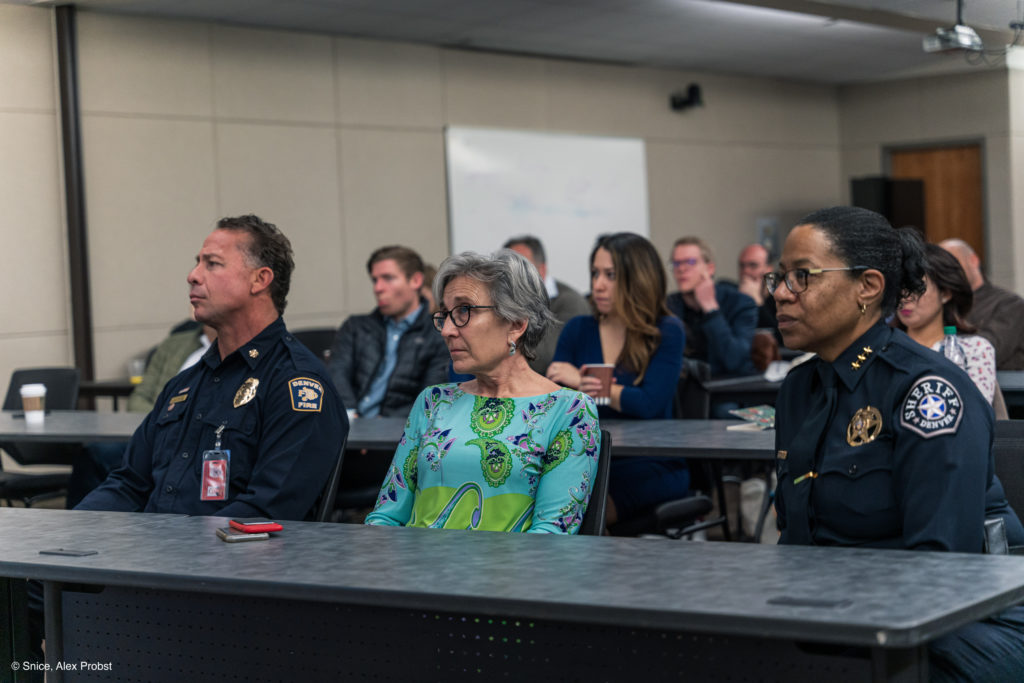
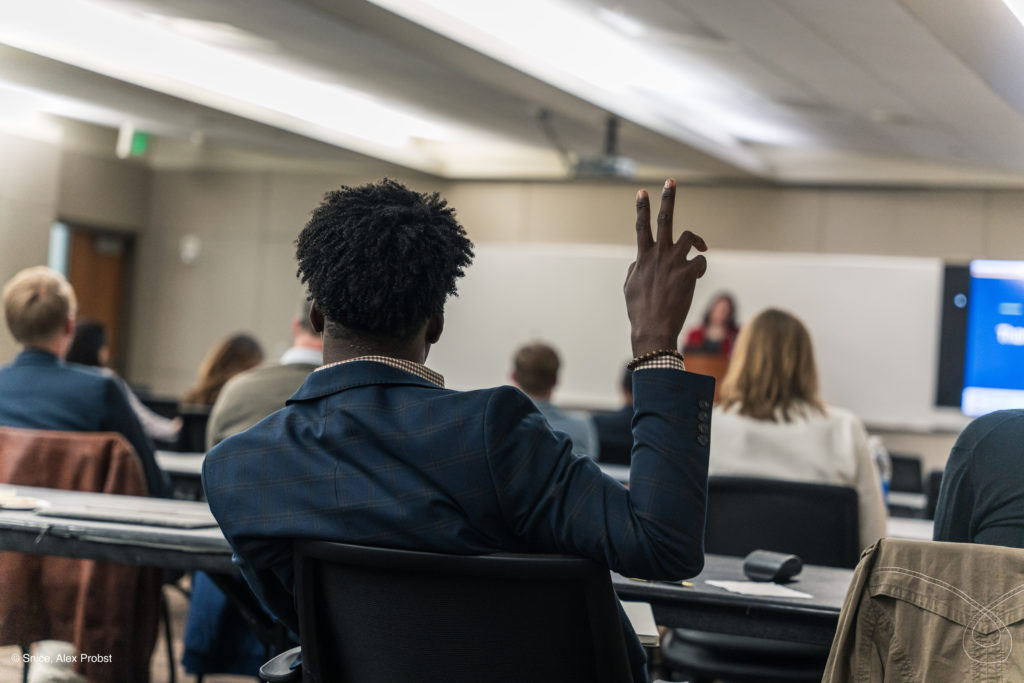

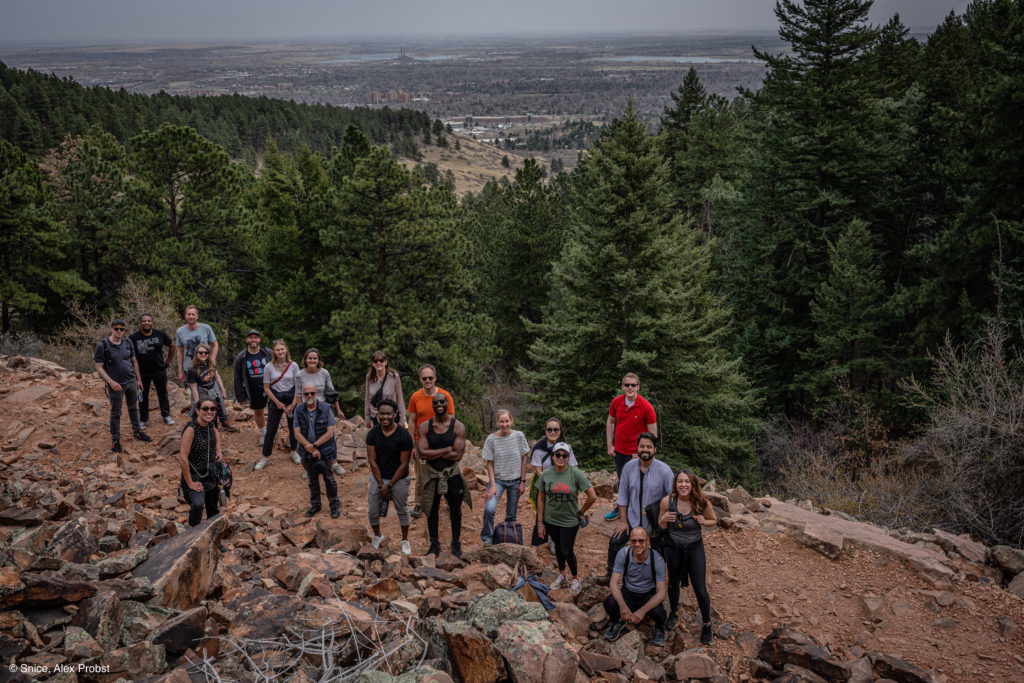
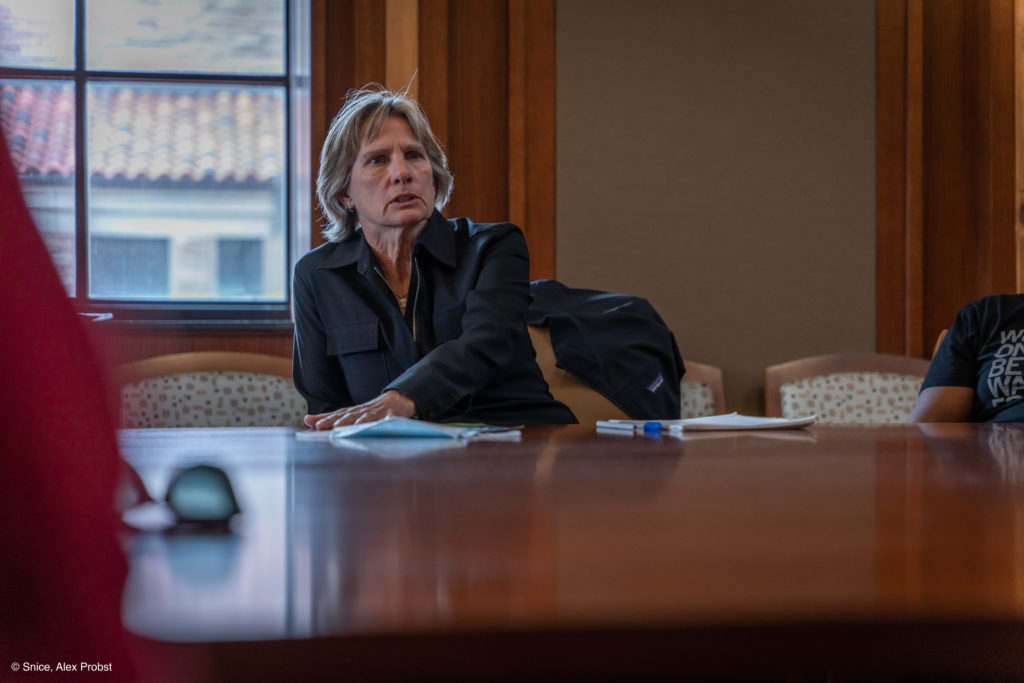
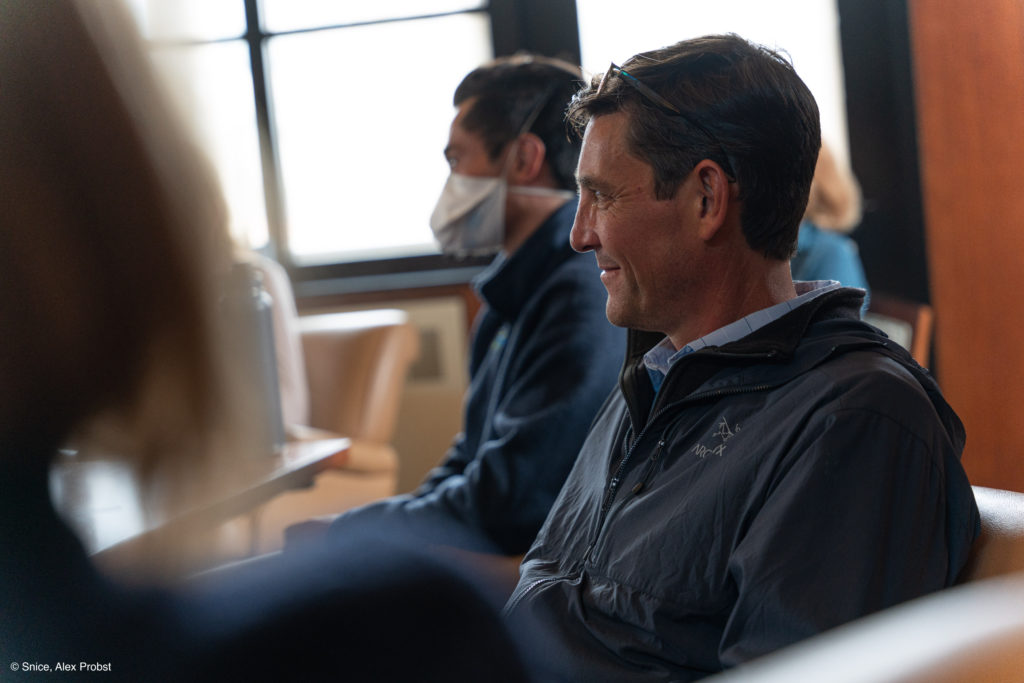

Third stop: Austin (April 27 – 30)
Our New Urban Progress fellows made their third and final stop on their US delegation tour through the United States in Austin, Texas. During their three-day stay in the Lone State capital, our fellows met with community organizations, activists, and local government officials on issues ranging from climate policies, democratic engagement, and urban development.
After visiting Tempelhofer Feld in Berlin and Northerly Island in Chicago, our delegation continued to learn about innovative ways the grounds and building of former airports can be re-invented for community spaces, affordable housing, and green areas in urban settings, by the example of the former Robert Mueller Municipal Airport site in Austin. The Mueller plan for the site’s redevelopment focuses, amongst other aspects, on ensuring diverse, affordable, and sustainable housing. Our fellows also explored Austin’s climate policies with two experts on the Austin Climate Equity Plan, which was adopted by the city council in 2021. During their meeting with Austin’s mayor Steve Adler, they had the opportunity to discuss the city’s efforts in ensuring progressive climate policies, democratic participation, and equitable urban development with the leader of the local government directly.
After nine long days filled with new impressions, practices, and inspiration, our fellows now return home to continue working on their papers centered around inclusive growth & innovation, networked governance & democracy, and sustainability & social mobility in urban development. Stay tuned for our detailed recap of the trip and our paper launch conference.
Find below a selection of our fellows’ impressions during their visit to Austin, Texas.

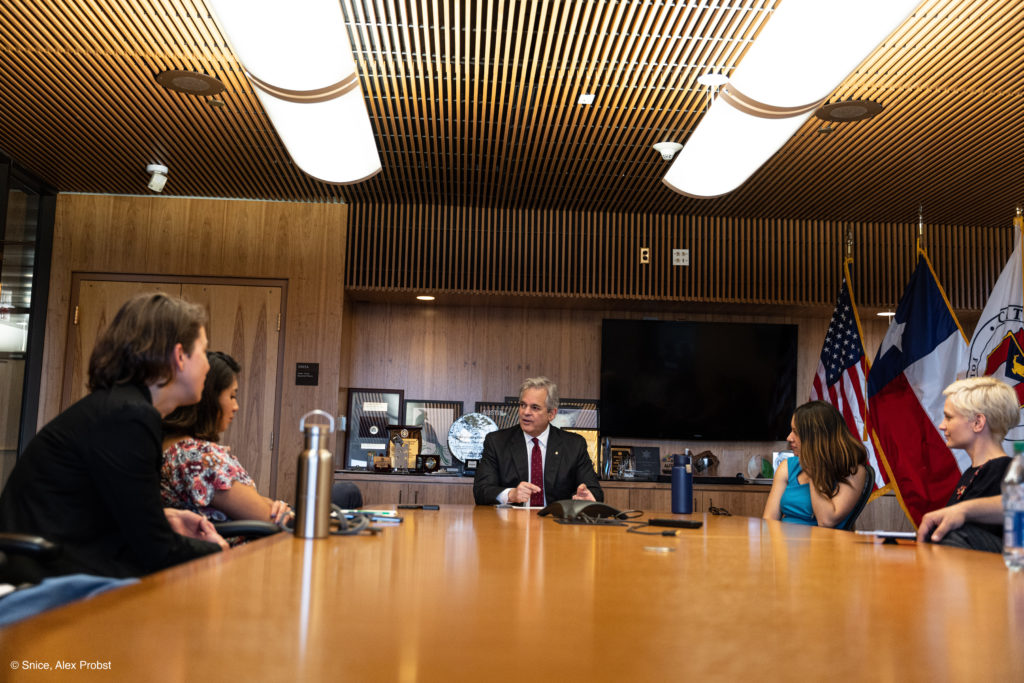
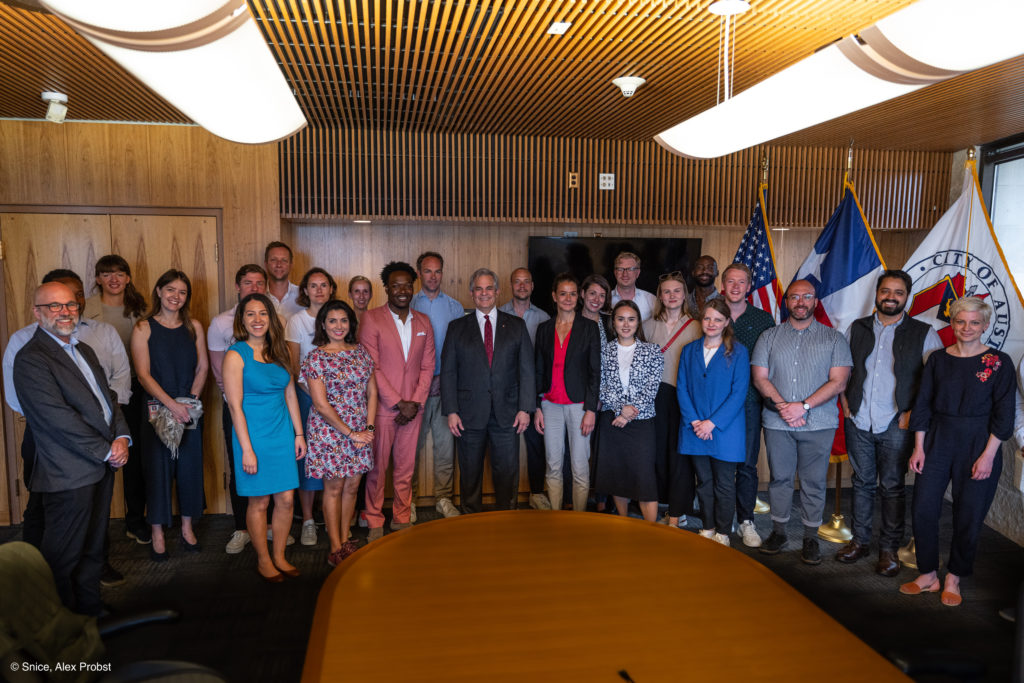
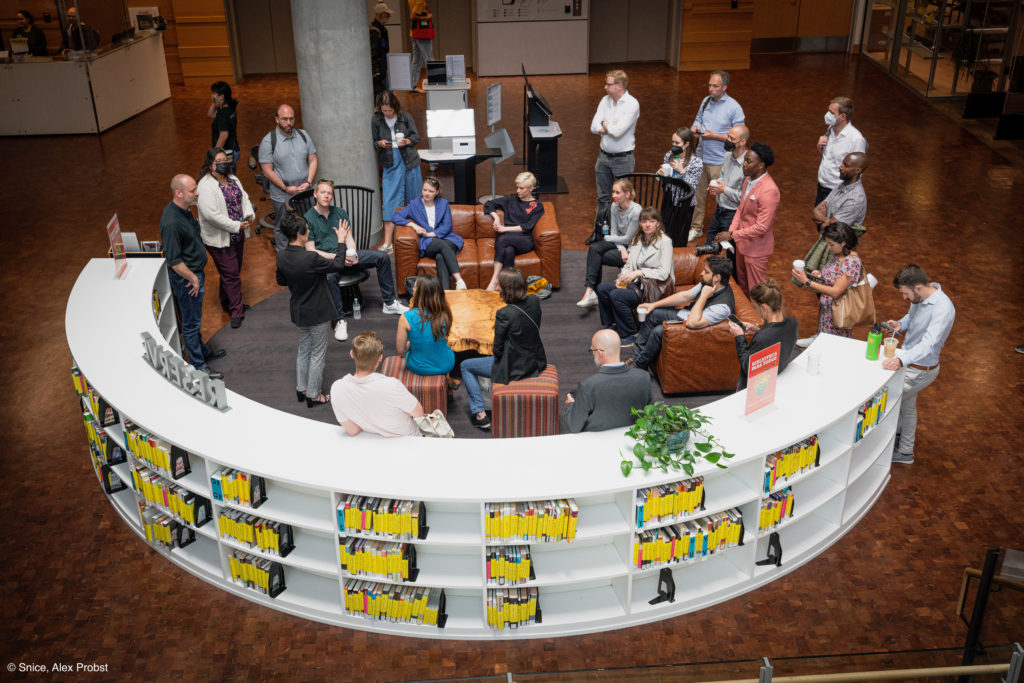

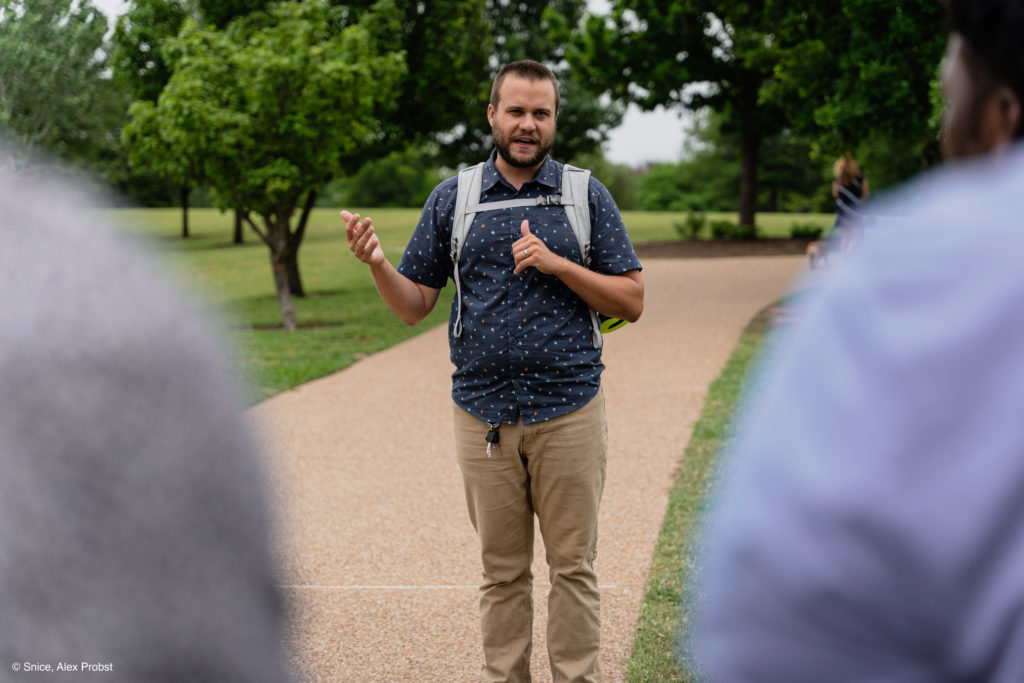
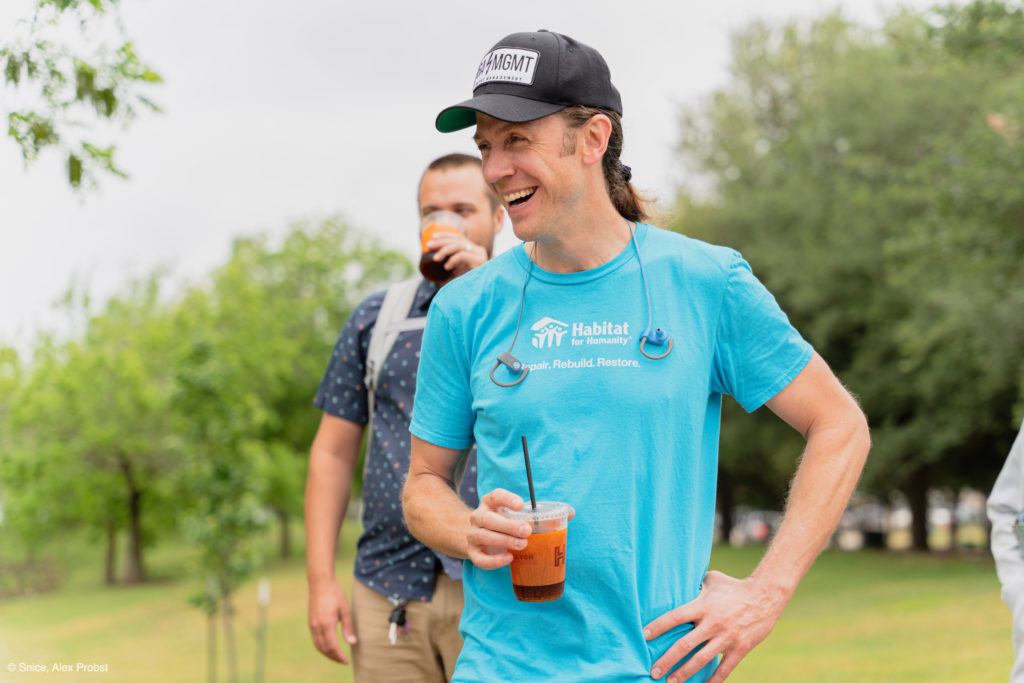
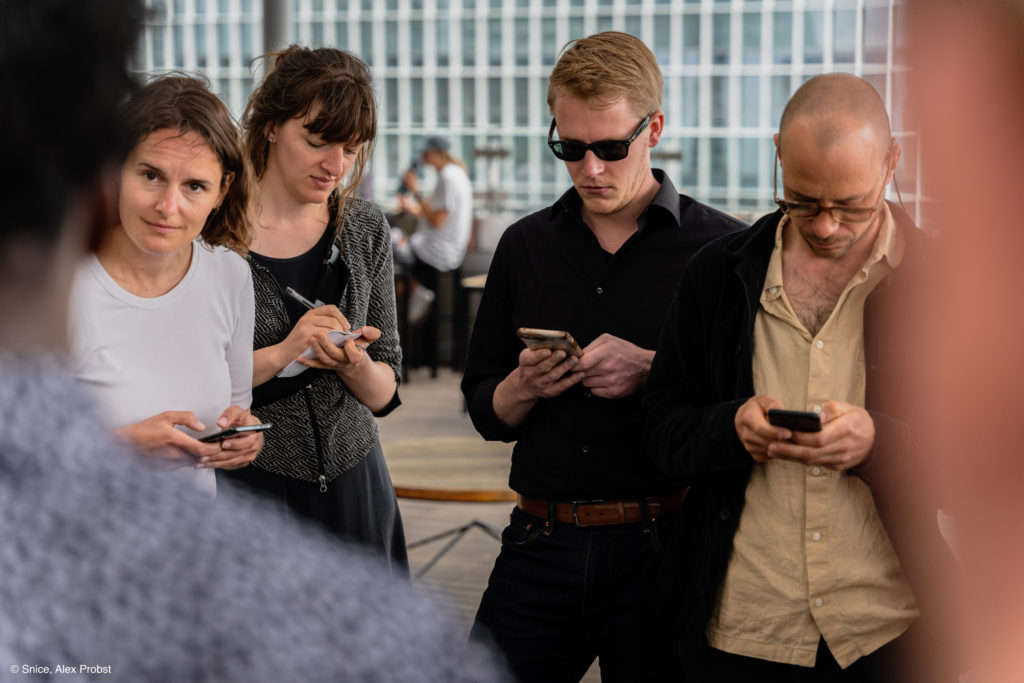
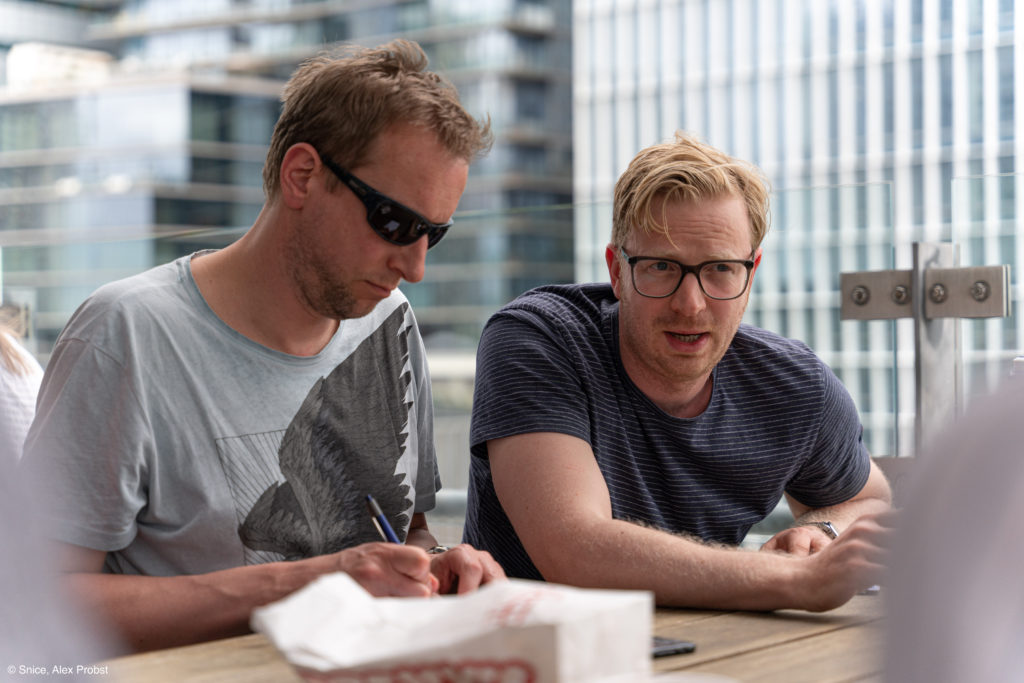
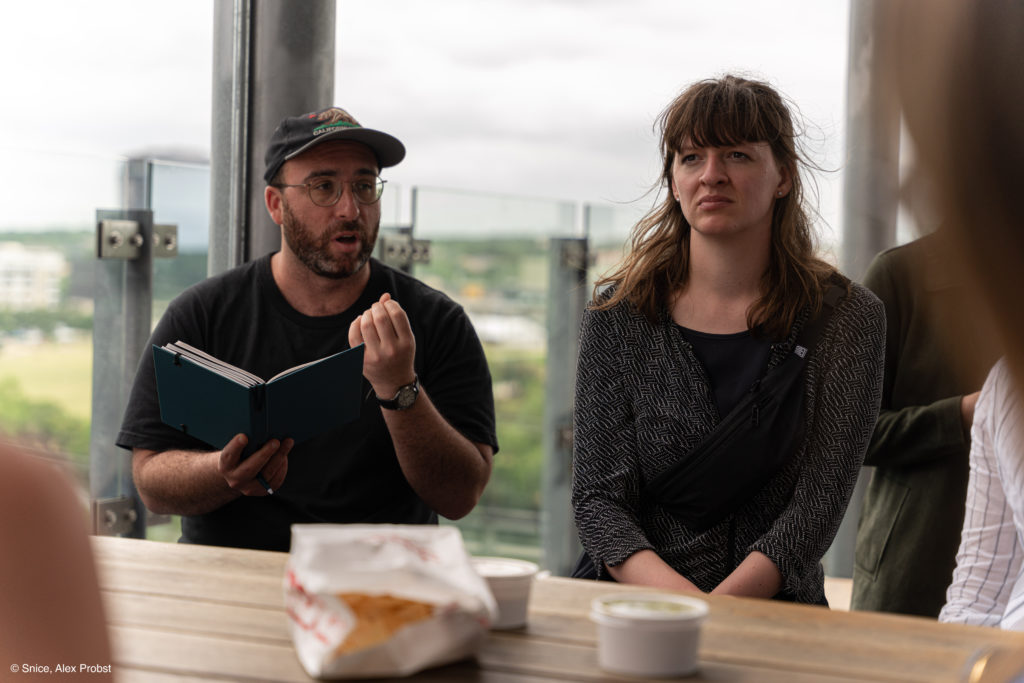
Deputy Mayor Ulrich Hörning of Leipzig on Civic Engagement in Urban Development
Picking up where we left off: As the fellows of New Urban Progress (NUP) are about to embark on their delegation trip through the United States, Deputy Mayor of Leipzig, Ulrich Hörning, reminds us of the importance of civic engagement in progressive urban development.
Last year the fellows of New Urban Progress had the opportunity to travel through Germany and visit Berlin, Leipzig, and the Ruhr Valley to explore urban development on this side of the Atlantic. On Thursday, April 21, they will embark on their second delegation trip, this time through the United States.
Deputy Mayor of Leipzig, Ulrich Hörning, was one of the urban actors our fellows had the opportunity of meeting with during their visit to Leipzig. Facing various economic, political, and social challenges after the German reunification in the early 1990s, Leipzig has manifested itself as an economic and innovative hub in the region, as well as a desirable destination for students, families, and other individuals. Mayor Hörning emphasized the important role civic engagement played in the 1990s and early 2000s in enabling this prosperous development.
As the NUP fellows prepare to travel to Chicago, Denver, and Austin, they will further explore the areas of entworked governance and democracy, inclusive growth and innovation, and sustainability and social mobility in progressive urban development.
New Urban Progress is the joint metro initiative of Das Progressive Zentrum, the Alfred Herrhausen Gesellschaft and the Progressive Policy Institute. The project is supported by the Transatlantic Program of the Federal Republic of Germany and funded by the European Recovery Program (ERP) of the Federal Ministry of Economics and Energy (BMWi).
Meet Mayor Uwe Schneidewind – Our New Patron
New Urban Progress is thrilled to announce its second patron: Mayor of Wuppertal, Uwe Schneidewind!
Mayor Schneidewind joins Mayor of Leipzig Burkhard Jung as our project’s second patron.
Uwe Schneidewind is Mayor of Wuppertal, a city of 350,000 in Western Germany. Mayor Schneidewind has a background in research and also served as President of the University of Oldenburg. From 2010-2020, he was the President of the Wuppertal Institute for the Environment, Climate, and Energy, a leading international think tank on sustainability research. Uwe Schneidewind is a member of the German Green Party and has been Mayor since 2020.
New Urban Progress patrons are leading mayors in Germany and the United States who embody the program’s mission of an innovative, democratic, and sustainable urban future.
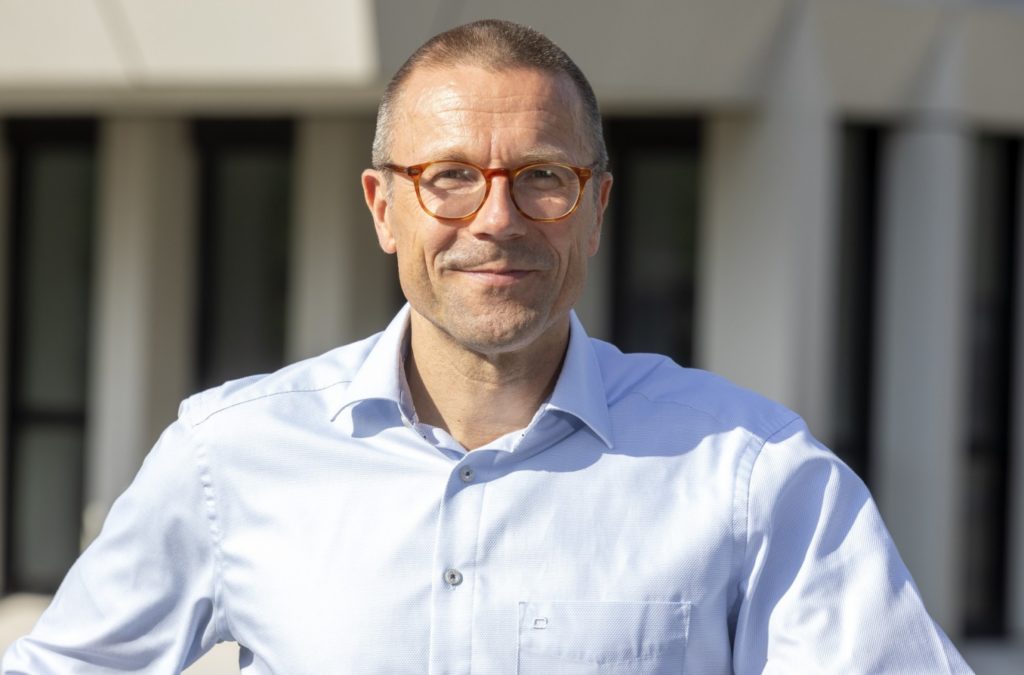
They help build our network and increase the impact and quantity of our exchange on urban progress.
Preparing cities for challenges of the present and the future
Climate-neutrality, reducing carbon emissions, affordable housing, social mobility. The challenges for cities are multi-faceted and become increasingly complex. Watch the video below to see how Uwe Schneidewind attempts to tackle the growing climate crisis and how the city of Wuppertal can pose as a sustainable role model for other cities in the future.
New Urban Progress is the joint metro initiative of Das Progressive Zentrum, the Alfred Herrhausen Gesellschaft and the Progressive Policy Institute. The project is supported by the Transatlantic Program of the Federal Republic of Germany and funded by the European Recovery Program (ERP) of the Federal Ministry of Economics and Energy (BMWi).
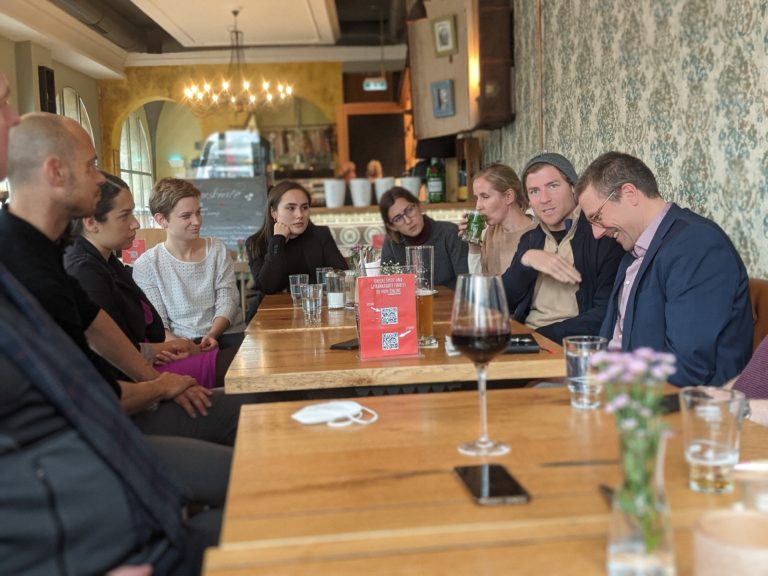
Recap: Our Delegation Trip Across Germany
Our first of two New Urban Progress delegation trips took our fellows to Berlin, Leipzig and the Ruhr Valley
A capital shaped by competing visions, an east German city in the midst of a comeback, and a sprawling post-industrial metropolis tackling 21st-century transformations head-on: The first of two delegation trips brought our New Urban Progress fellows to Berlin, Leipzig, and the Ruhr Valley – urban spaces in Germany that are defining the future of the city.
Meeting for the first time, our fellows from the United States and Germany visited urban leaders who are making cities more innovative, democratic and sustainable. After a ten month digital work phase, the main goal of the delegation trip was to engage with best practices of urban progress and transatlantic cooperation in Germany.
From staff at the United States Embassy in Berlin, to Fridays for Future organizers, to the Mayors of Leipzig and Wuppertal as well as the Berlin State Secretary for Housing, the New Urban Progress fellows will be able to apply a wide range of approaches and lessons-learned to their project work. Below, see how our trip as a whole was a transatlantic exchange on the future of cities by exploring the places we visited on a map, checking-out our day-to-day itinerary, reading the trip journals, and watching short videos from our adventures.
Want to learn more and read the results? Sign up for our newsletter here.
Rewatch the Highlights
Our Trip: A Week Across Germany
At the beginning of the delegation trip, the New Urban Progress fellows attended Innocracy 2021, a conference on democratic innovation.
New Urban Progress at Innocracy 2021: Democratizing the City
 Cities are dynamic networks brimming with social, economic and political life. Yet, how inclusive and reflective are these spaces of everyday people’s interests and needs? During the Innocracy 2021 conference, New Urban Progress fellows Victoria Boeck, Julian St Patrick Clayton, and Richard Lawrence Jr. gave lightning talks on democratizing the city. The discussion was moderated by Diego Rivas, Project Manager at Das Progressive Zentrum.
Cities are dynamic networks brimming with social, economic and political life. Yet, how inclusive and reflective are these spaces of everyday people’s interests and needs? During the Innocracy 2021 conference, New Urban Progress fellows Victoria Boeck, Julian St Patrick Clayton, and Richard Lawrence Jr. gave lightning talks on democratizing the city. The discussion was moderated by Diego Rivas, Project Manager at Das Progressive Zentrum.
Learn more about Innocracy 2021 here: https://innocracy.eu/
After a free day of exploring Berlin on Saturday, the fellows toured places that were once future visions of Berlin.
Contrasting visions of Hansaviertel and Karl-Marx-Allee
When Berlin was divided between East and West, the cold war competition also shaped urban planning. Hansaviertel is a neighborhood where the West’s ideas about modernity were put into practice, with residential buildings from many of the most cutting-edge post-war architects such as Le Corbusier, Oscar Niemeyer, Alvar Aalto or Walter Gropius. The Karl-Marx-Allee in the East presents a starkly contrasting vision: A grand boulevard lined with so-called “Arbeiterpaläste” (worker’s palaces), it was built as a show of strength towards the West. While visiting these unrealized visions, the fellows discussed why visions for a city are necessary, but also how visions can become a reality.
Current visions of the city: Innovation, Housing and Activism, Green Citizen Initiatives and Local Politics
To discuss Berlin’s current visions and how they are being implemented, the fellows focused on how actors in Berlin are making the city more innovative and more green.
- Innovation: Meeting with Adriana Groh of Sovereign Tech Fund and the New Institute, we discussed how cities can support innovation sustainably and the role of open source software in urban environments.
- Local Politics and a Green Community: We also met district councilwoman in Friedrichshain-Kreuzberg Julie Richier. A member of the Green Party (Bündnis 90/Die Grünen) and previously policy advisor on climate and international issues to the Berlin Senate, on a walking tour of the neighborhood, Julie talked about current initiatives on how the district is trying to make housing more affordable and the community as a whole more sustainable.
Living the Transatlantic Relationship
 At the core of New Urban Progress is strengthening the relationship between the United States and Germany. Our delegation met with other leading transatlantic actors to informally discuss the future of transatlantic relations and what role urban spaces could play in improving transatlantic ties. With representatives from the Atlantic Brücke, German Federal Foreign Office, US Embassy and more, an impactful exchange took place. Elisabeth Niejahr gave a keynote speech on the role of local democracies in the transatlantic partnership complemented by a second keynote by Olaf Boehnke on building alliances of liberal democracies.
At the core of New Urban Progress is strengthening the relationship between the United States and Germany. Our delegation met with other leading transatlantic actors to informally discuss the future of transatlantic relations and what role urban spaces could play in improving transatlantic ties. With representatives from the Atlantic Brücke, German Federal Foreign Office, US Embassy and more, an impactful exchange took place. Elisabeth Niejahr gave a keynote speech on the role of local democracies in the transatlantic partnership complemented by a second keynote by Olaf Boehnke on building alliances of liberal democracies.
On Monday, the fellows went to two contested and unique spaces in Berlin: the former Tempelhof airport and Kottbusser Tor.
The former Tempelhof airport
A vast expanse in the middle of the city: The former Tempelhof airport field is a unique public space made possible by the closing of the inner-city airport in 2008. Especially in the summer, the 355-hectare-park is brimming with activity. Built by the Nazis, the location of the Berlin Airlift and now a public park – this space has experienced drastically different purposes. After walking across the public park, we toured the former airport building, learning about its past as well as its current and future visions.
North of the former airport turned park, the fellows visited the floating university. Stylized as the “Floating University”, this is no ordinary university, but an experimental place for learning, art, and neighborhood activism. It uses the rainwater collection basin of the former Tempelhof airport for numerous projects ranging from an “urban practice-in-residence” programme to a Kids Uni.
CityLAB
 CityLAB brings together government, civil society, academia and start-ups to support digital innovations and to improve public services. The lab puts a special focus on civic participation, innovative administration, open data, and sustainability. It is developing a smart city strategy for Berlin. Examples for how the CityLAB employs digital tools to improve civic participation include the digital platform “Gieß den Kiez” (water the neighborhood), where citizens have coordinated supplying public green spaces more than 7000 hectoliters of water in 2021. CityLAB is a project by the Technologiestiftung Berlin. New Urban Progress fellow Victoria Boeck works as Research Associate for open data at the lab.
CityLAB brings together government, civil society, academia and start-ups to support digital innovations and to improve public services. The lab puts a special focus on civic participation, innovative administration, open data, and sustainability. It is developing a smart city strategy for Berlin. Examples for how the CityLAB employs digital tools to improve civic participation include the digital platform “Gieß den Kiez” (water the neighborhood), where citizens have coordinated supplying public green spaces more than 7000 hectoliters of water in 2021. CityLAB is a project by the Technologiestiftung Berlin. New Urban Progress fellow Victoria Boeck works as Research Associate for open data at the lab.
Kottbusser Tor
Kottbusser Tor is an iconic place around the subway station of the same name in the Kreuzberg district of Berlin. It is home to social housing and, historically, a large Turkish immigrant community.
New Urban Progress fellows toured the neighborhood with Wenke Christoph, Berlin’s State Secretary Urban Development and Housing. Also on the tour was an organizer from Kotti Coop, a non-profit group that works on improving civic participation in planning processes. On the tour, our fellows were able to learn about current housing policies in Berlin and what multiple actors are doing to make housing more affordable and accessible.
Drinks with local journalists and tech experts
At the end of the day, New Urban Progress fellows had the opportunity for an informal exchange with journalists from Der Tagesspiegel. Two journalists who focus each on one of Berlin’s districts for Tagesspiegel Leute, a set of weekly newsletters for each of Berlin’s twelve districts, led the discussion. Afterwards, the fellows talked to tech and innovation leaders living in Berlin.
On Tuesday, the New Urban Progress fellows traveled from Berlin to Leipzig. In both cities, they talked to actors deeply involved in the transatlantic partnership, including climate activists and having dinner with Leipzig’s Deputy Mayor.
US embassy
Situated right beside the Brandenburg Gate, the US embassy in Berlin is representative of the crucial role transatlantic relations have played in modern German history. The fellows met with a Political Advisor, the Technology and Science Advisor, and Economic Counselor to discuss new approaches to transatlanticism for today and the future.
Senate Chancellery for International Affairs
The Berlin Senate Chancellery for International Affairs manages the city government’s 17 city partnerships and membership in numerous city networks. The fellows met with Thomas Honeck and Evelyn Baldenhofer. Thomas Honeck is an urban researcher, human geographer and media scientist. At the Chancellery, he is in charge of international network policies. Evelyn Baldenhofer is commissioner for Berlin’s transatlantic relations and coordinates Berlin’s city partnerships.
Meeting Fridays For Future activists
 Before setting out to Leipzig, the New Urban Progress fellows met two young activists, Carla Reemtsma and Nick Heubeck from Fridays For Future. Berlin is a major hub for the youth climate movement: More than 100,000 people participated in protests on 24 September 2021 in Berlin, demanding bold climate policies ahead of the German election. In their exchange with New Urban Progress, the activists explained their grassroots approach to organizing locally, nationally, and transnationally.
Before setting out to Leipzig, the New Urban Progress fellows met two young activists, Carla Reemtsma and Nick Heubeck from Fridays For Future. Berlin is a major hub for the youth climate movement: More than 100,000 people participated in protests on 24 September 2021 in Berlin, demanding bold climate policies ahead of the German election. In their exchange with New Urban Progress, the activists explained their grassroots approach to organizing locally, nationally, and transnationally.
A reception at DAIS
The German-American Institute Saxony (Deutsch-Amerikanisches Institut Sachsen, DAIS) in Leipzig is strengthening the transatlantic partnership by bringing actors far away from the capital into the conversation. At the institute, the fellows discussed with DAIS representatives the role that cities and regions can play in improving ties between the two countries.
Dinner with Leipzig Deputy Mayor Ulrich Hörning
 Before being elected Deputy Mayor of Leipzig in November 2015, Ulrich Hörning worked at the World Bank and in Germany’s Federal Ministry of Finance. The main topics on his agenda are Leipzig’s future urban development and digitalization. Over dinner, he discussed with the fellows how to involve all of society in long-term city planning, such as the Leipzig 2030 development plan.
Before being elected Deputy Mayor of Leipzig in November 2015, Ulrich Hörning worked at the World Bank and in Germany’s Federal Ministry of Finance. The main topics on his agenda are Leipzig’s future urban development and digitalization. Over dinner, he discussed with the fellows how to involve all of society in long-term city planning, such as the Leipzig 2030 development plan.
On Wednesday, the fellows explored city development from three angles: long-term city planning, entrepreneurship, and civic activism.
Leipzig 2030
 Leipzig has grown rapidly. At the Leipzig City Hall, the New Urban Progress fellows received a presentation from urban planners about Leipzig 2030 and how the city is working on making their comeback more permanent while raising the international profile of the city. The fellows also met with the Mayor of Leipzig Burkhard Jung.
Leipzig has grown rapidly. At the Leipzig City Hall, the New Urban Progress fellows received a presentation from urban planners about Leipzig 2030 and how the city is working on making their comeback more permanent while raising the international profile of the city. The fellows also met with the Mayor of Leipzig Burkhard Jung.
SpinLab
SpinLab is a start-up accelerator based in Leipzig. Working with numerous partners, among them Dell Technologies and the Red Cross, SpinLab offers free support for young entrepreneurs to put their ideas into practice. A special focus lies in e-health, energy and smart city innovation. At SpinLab, the fellows were introduced to some of the start-ups that the start-up accelerator has helped grow.
Unteilbar
Unteilbar (indivisible) is a civil society organization that has initiated large protests focused on anti-racism and social, gender, and climate justice. The first #unteilbar protest in Berlin attracted more than 240,000 people. Talking to the New Urban Progress fellows, the Unteilbar organizers explained how they unite actors from across civil society against the far right and for migration to keep communities open and welcoming to people from all backgrounds.
Cycling through Leipzig’s West
 The New Urban Progress fellows explored Leipzig’s western neighborhood Plagwitz by bike! Biking through Leipzig, we were able to put streets and buildings to all of the plans and policies that we heard about. Plagwitz is an area of the city that has made a surprising comeback, thanks to both far-sighted city planning and contributions from an active civil society.
The New Urban Progress fellows explored Leipzig’s western neighborhood Plagwitz by bike! Biking through Leipzig, we were able to put streets and buildings to all of the plans and policies that we heard about. Plagwitz is an area of the city that has made a surprising comeback, thanks to both far-sighted city planning and contributions from an active civil society.
On a stormy Thursday, the fellows took a train from Leipzig to the Ruhr Valley and began exploring the vast metropolitan area with two tours through Essen.
Structural Change in Essen
The Ruhr Valley used to be Germany’s strongest industrial region. The city of Essen was one major urban center in the sprawling metropolitan area that encompassed some of Europe’s largest coal mines and steel mills. For several decades, the region has been deeply shaped by structural change as old jobs have moved away. During a tour of the city, the New Urban Progress fellows gained an understanding how the urban landscape of Essen has been shaped by the global processes underlying the structural changes.
Folkwang Museum
Today, the Ruhr region has become internationally acclaimed for its arts and culture scene, but art has a long tradition in the area: Founded in 1902, Museum Folkwang is a leading museum of modern art. Our fellows had the opportunity to visit the museum’s exhibitions at the newly built museum site, which was constructed for the RUHR.2010 project when Essen was European Capital of Culture.
On Friday, the fellows saw how a region struggling through a difficult economic transition can still successfully tackle the climate crisis.
Wuppertal Institute
The Wuppertal Institute for Climate, Environment, and Energy is a research institute and think tank focusing on climate and sustainability issues. Located in the city of Wuppertal, its research areas span the energy transition, sustainable consumption and mobility. The New Urban Progress fellows learned how the Institute advises cities on how to manage the ecological transformation.
Lunch with Wuppertal Mayor Uwe Schneidewind
 Uwe Schneidewind was director of the Wuppertal Institute for ten years before he was elected the city’s Lord Mayor in November 2020. A member of the Green Party (Bündnis 90/Die Grünen), he is considered one of Germany’s foremost economists and and a preeminent expert in sustainability research. Over lunch, he discussed with the New Urban Progress fellows the role of different actors in implementing change in an urban environment.
Uwe Schneidewind was director of the Wuppertal Institute for ten years before he was elected the city’s Lord Mayor in November 2020. A member of the Green Party (Bündnis 90/Die Grünen), he is considered one of Germany’s foremost economists and and a preeminent expert in sustainability research. Over lunch, he discussed with the New Urban Progress fellows the role of different actors in implementing change in an urban environment.
Walking through “Klimaquartier Arrenberg”
Arrenberg is a neighborhood in Wuppertal with a dedicated community, organized in the non-profit “Aufbruch am Arrenberg”. Aufbruch can be translated either as “new start” or “departure” and signifies the neighborhood’s commitment to proactively manage change, oriented at the United Nations sustainable development goals. A major initiative is designating the neighborhood as a “Klimaquartier” (climate quarters), aiming to make living in Arrenberg climate-neutral by 2030. The New Urban Progress fellows toured the neighborhood to see such projects in practice.
Discovering an Industrial Park in Duisburg
The coal and steel industry was not only the major source for the Ruhr Valley’s economic power. It was also the first trade to be liberalized in Western Europe in the Coal and Steel Community, an early building block of European integration that would eventually develop into the European Union. Duisburg, a city in the western part of the metropolitan region, soon realized that even after they closed, the industrial sites were still vital to the region’s culture. The Industrial Park in Duisburg (Landschaftspark Duisburg-Nord) is a public park that was designed for the International Architecture Exhibition Emscher Park in 1989. Today, it is often ranked as one of the best urban green spaces, precisely because it preserves and integrates many of the old industrial sites as monuments to the city’s industrial legacy. The New Urban Progress fellows experienced the park at night, when the decommissioned industrial buildings are lit in spectacular colors.
Before saying goodbye, the fellows visited the Zeche Zollverein, an internationally acclaimed coal mine-turned-monument and cultural site.
Zeche Zollverein
 The Zeche Zollverein is a former coal mine that was closed in 1986. In 2001, it was designated a UNESCO World Heritage Site. It is one of the Ruhr Valley’s best known industrial monuments and hosts many cultural institutions, including the Ruhrmuseum and the Folkwang University of the Arts. Zeche Zollverein’s green spaces also have exceptional biodiversity.
The Zeche Zollverein is a former coal mine that was closed in 1986. In 2001, it was designated a UNESCO World Heritage Site. It is one of the Ruhr Valley’s best known industrial monuments and hosts many cultural institutions, including the Ruhrmuseum and the Folkwang University of the Arts. Zeche Zollverein’s green spaces also have exceptional biodiversity.
During their final day of the delegation trip, the New Urban Progress fellows toured the site and visited an exhibition focused on the life and economic contributions of the Turkish diaspora in Germany.
Impressions from our Trip
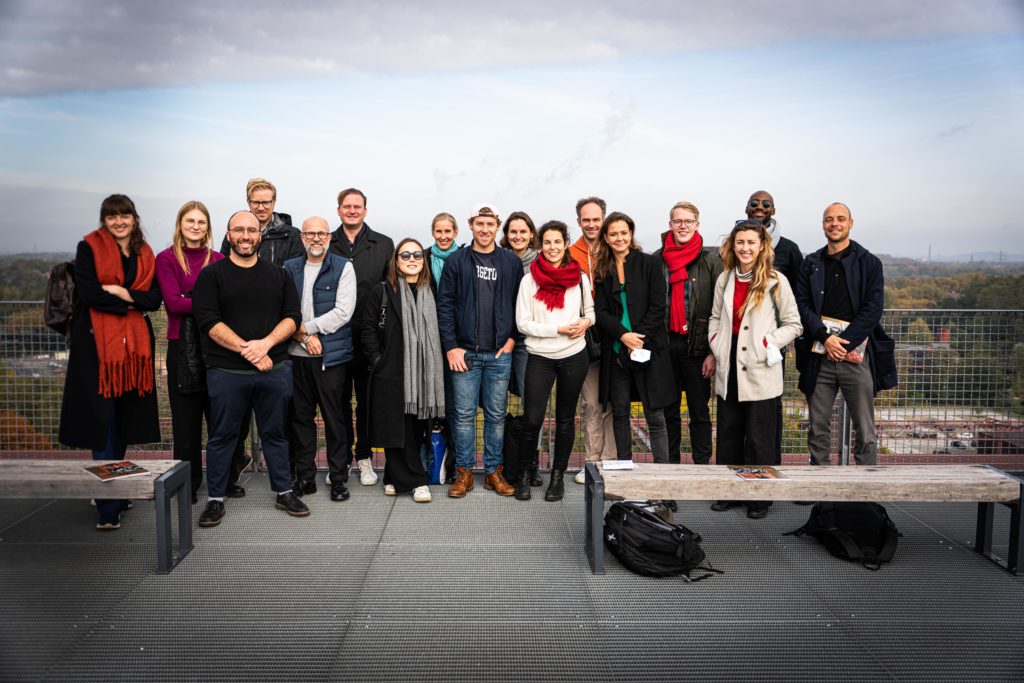
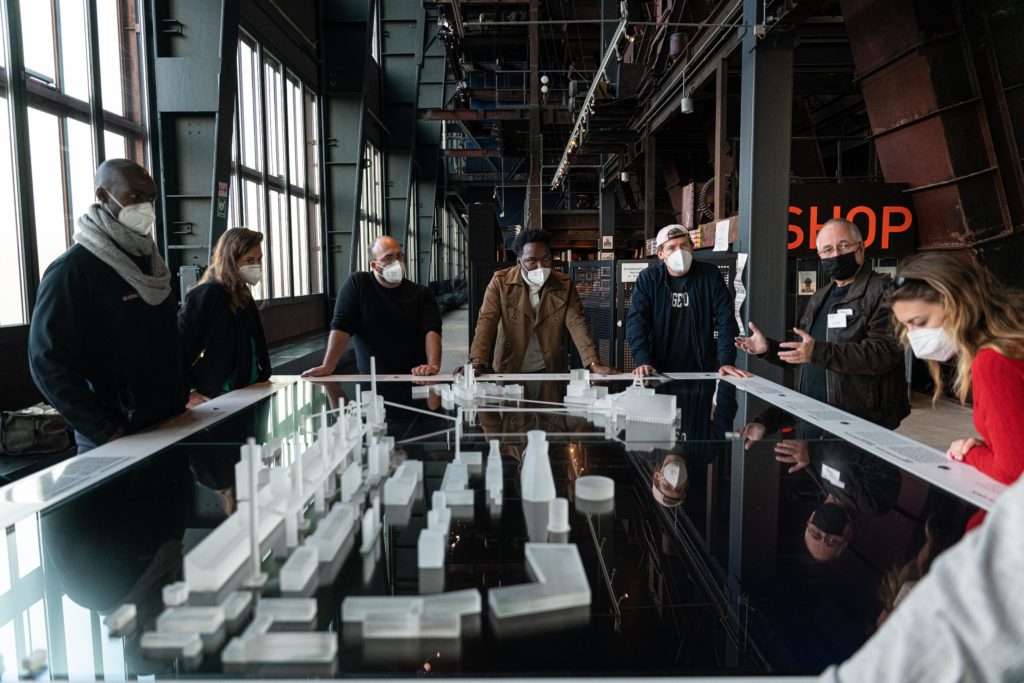

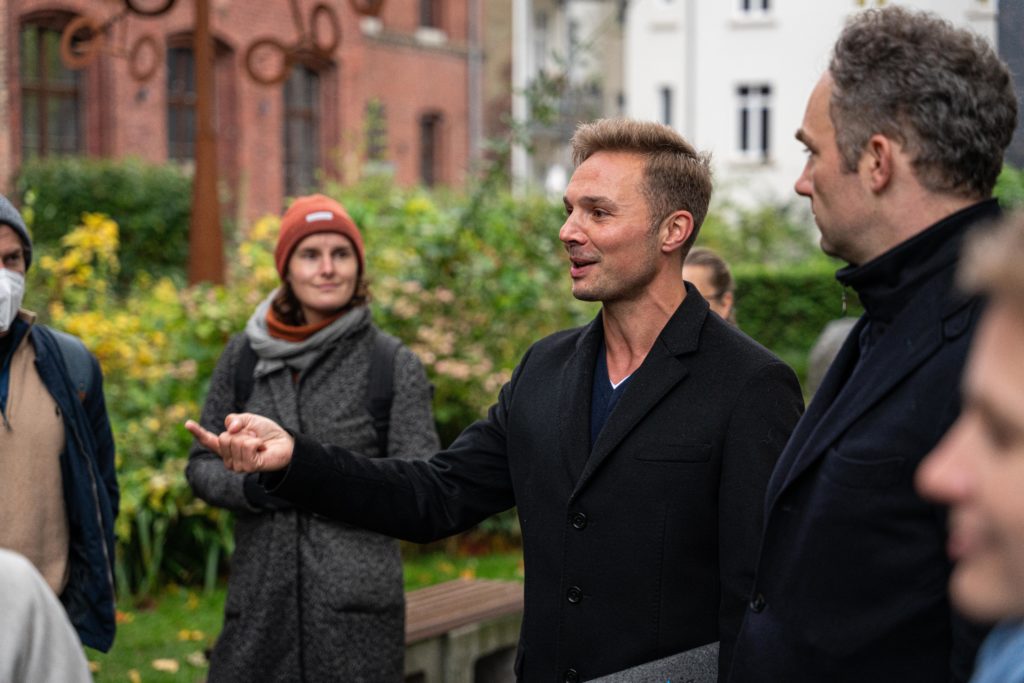
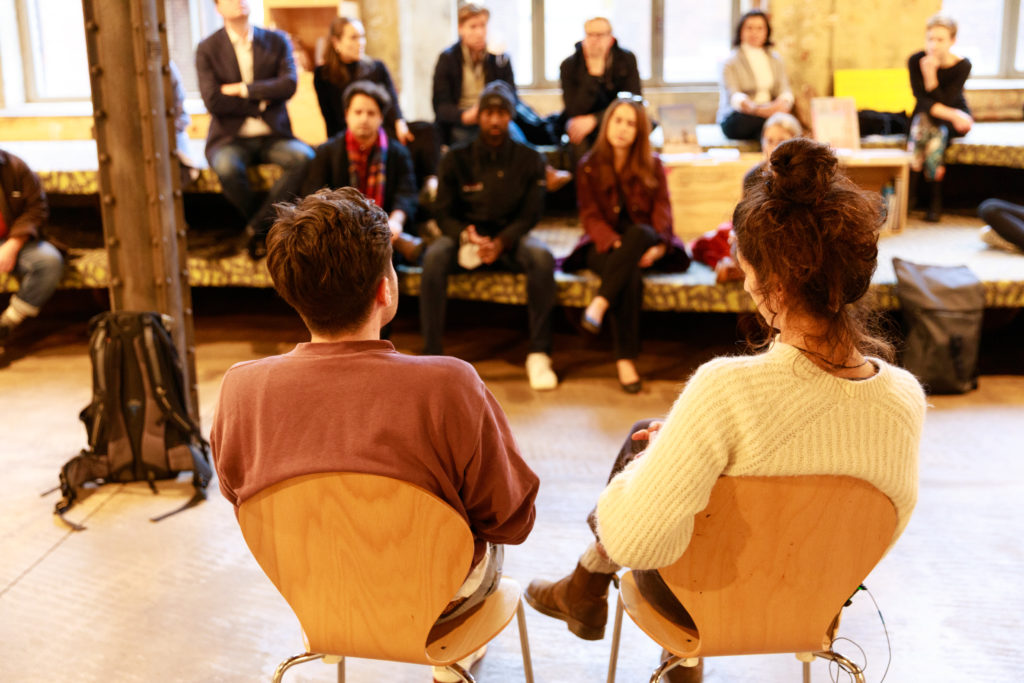
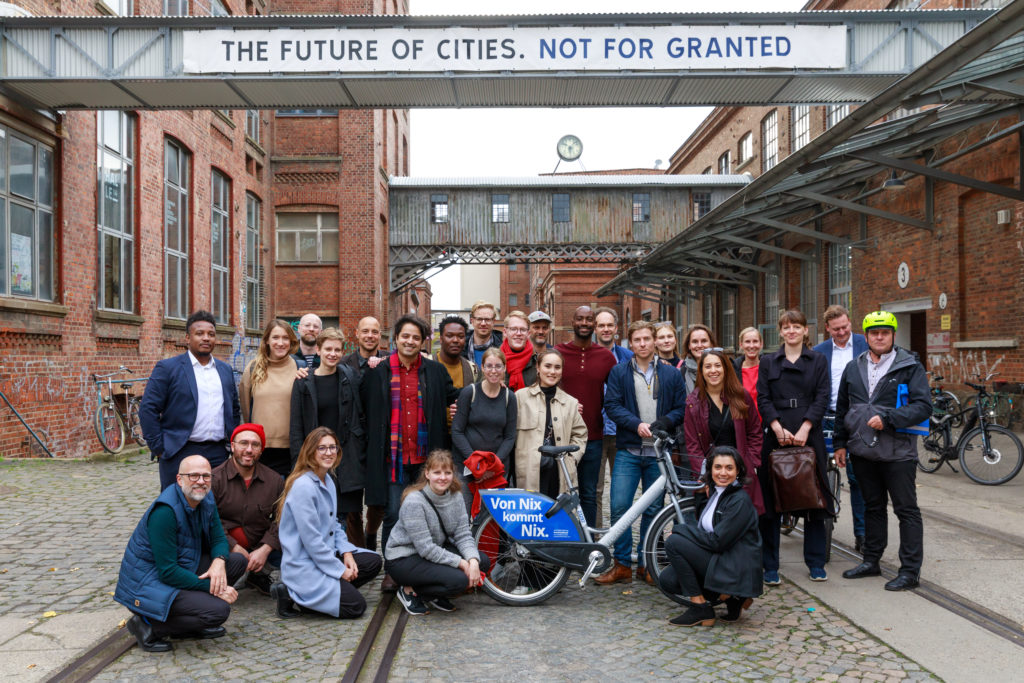
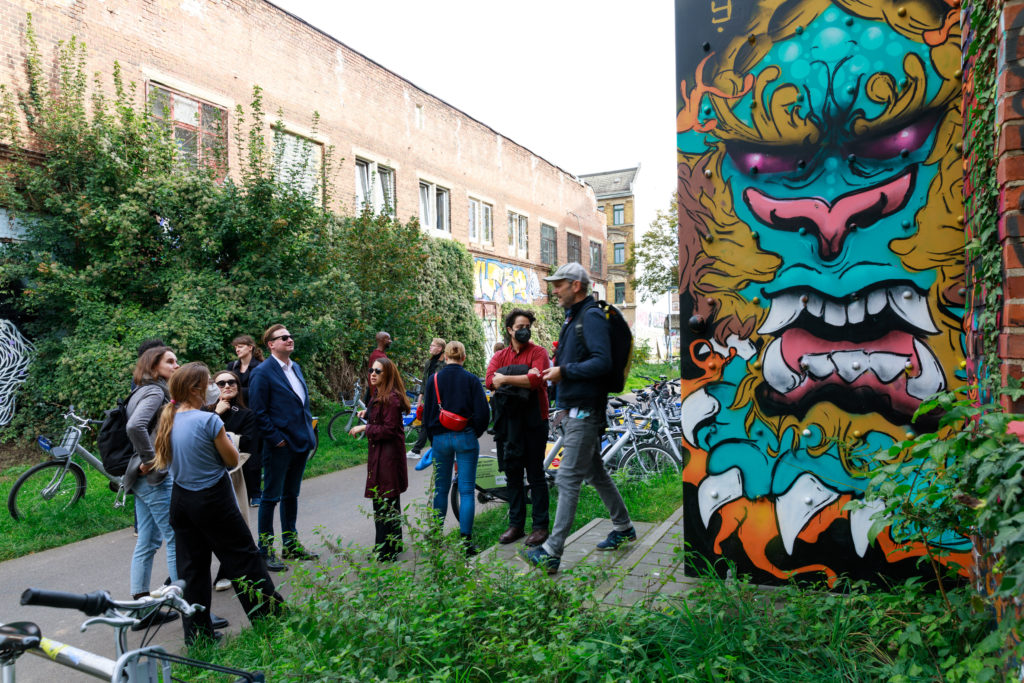
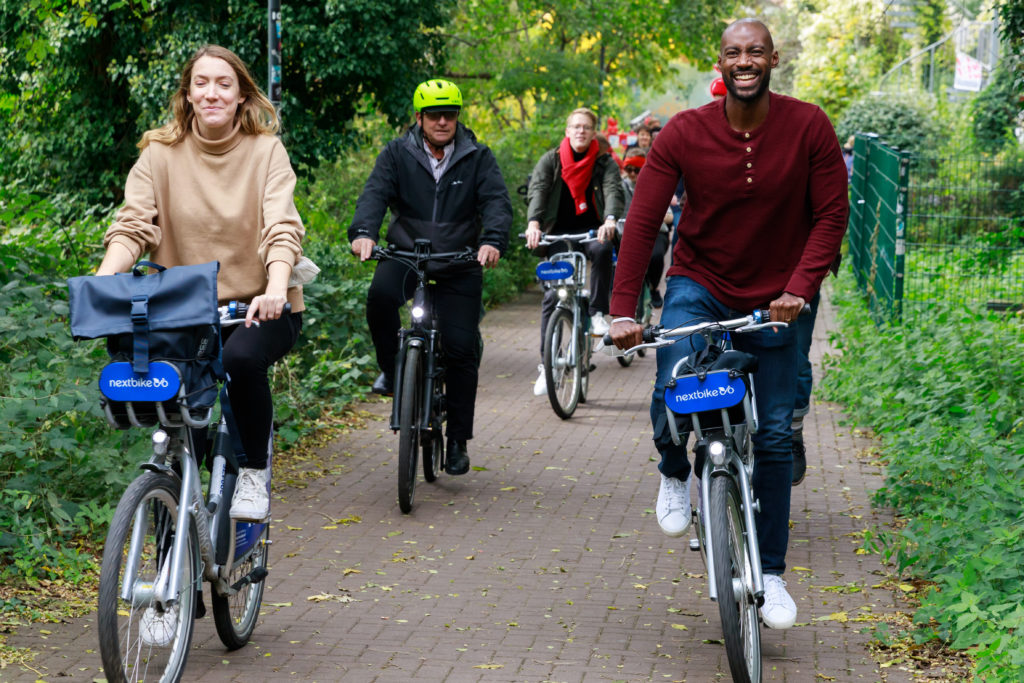
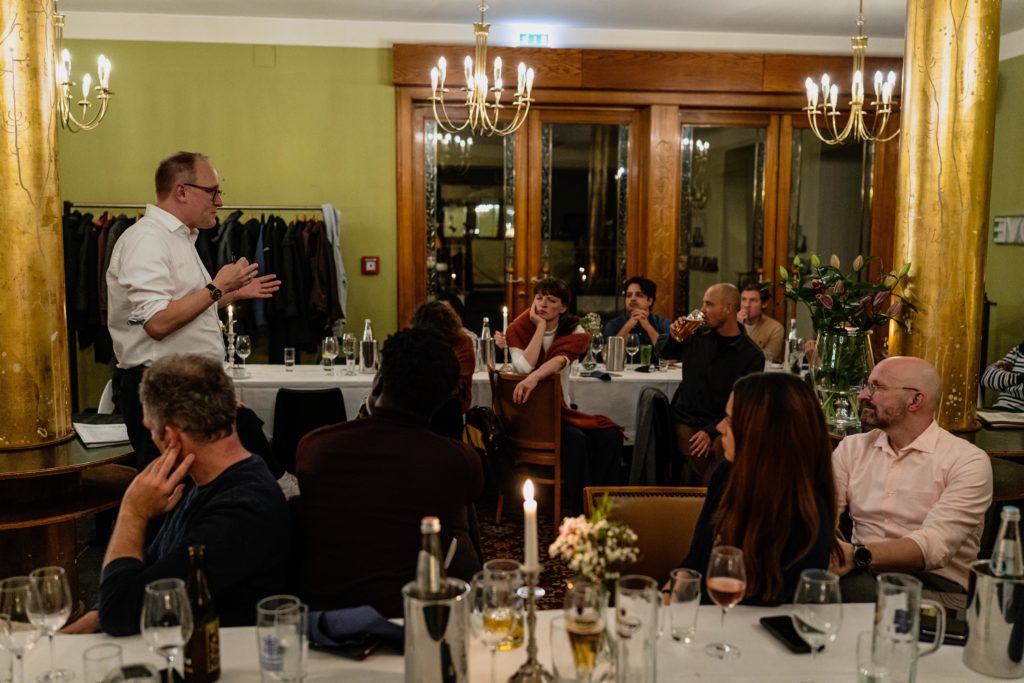
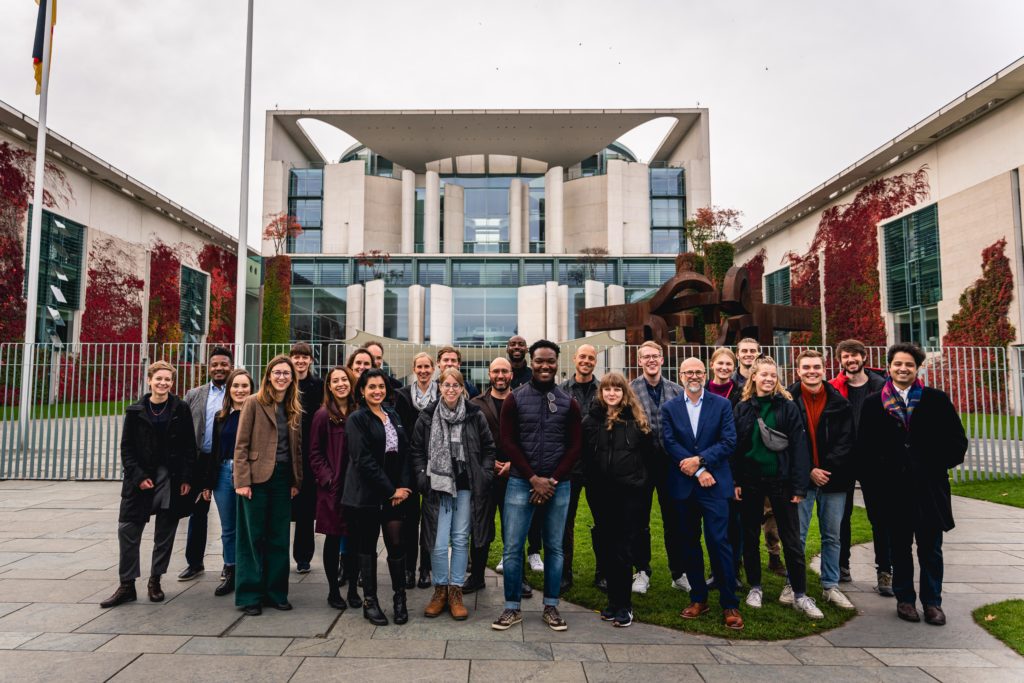
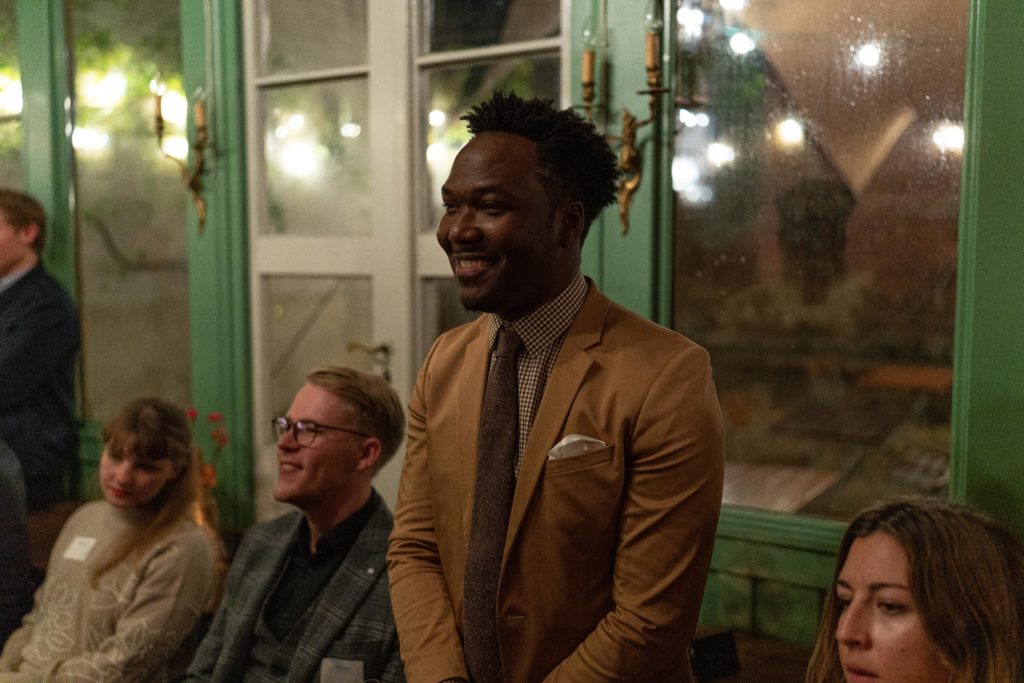
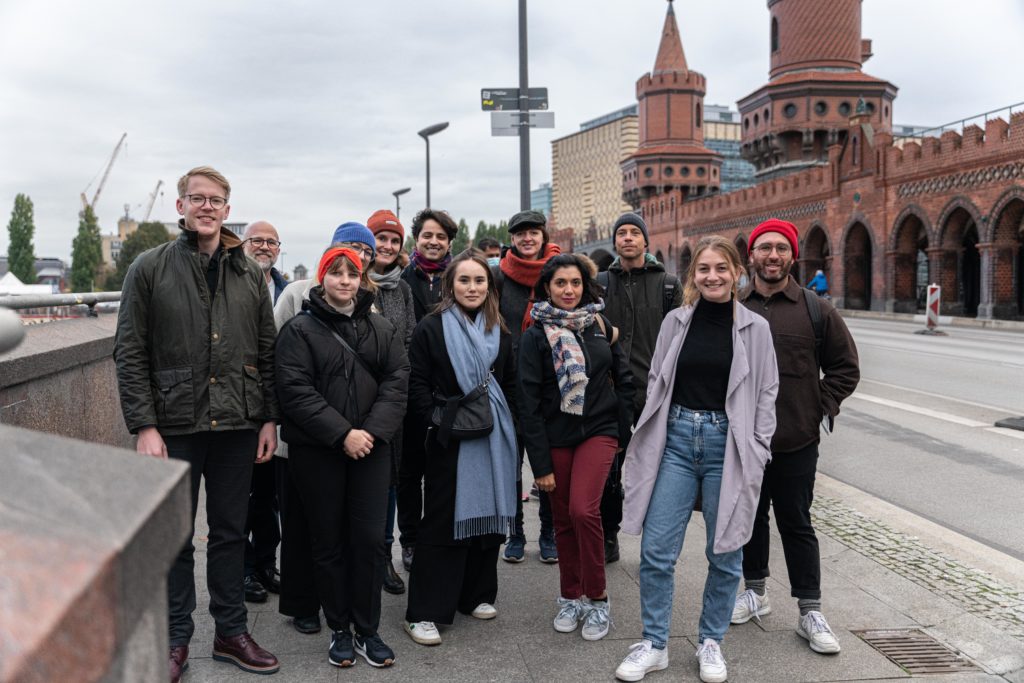


Trip Journals
Sunday, October 17, Berlin: Two Visions, Similar Challenges
In this Trip Journal, Alexander Czeh, Alison Noehrbass, Andrea Gonzalez and Victoria Boeck reflect on a day in which they explored Berlin’s competing visions of social housing by foot.
Monday, October 18, Berlin: Transformations and the City of the Future
In this Trip Journal, Andrea Jonas, Friedrich Paulsen and Francesca Weber-Newth draw on their experiences made on Monday, October 19, which began at the site of the former Tempelhof Airport.
Tuesday, October 19, Berlin & Leipzig: Transatlantic Conversations
In this Trip Journal, Grace Levin, Ian Lundy, Jamaal Glenn and Steffen Haake reflect on the transatlantic conversations they had in Berlin and Leipzig.
Wednesday, October 20, Leipzig: “The future of cities. Not for granted.”
In this Trip Journal, Julia Diringer, Julian St. Patrick Clayton, Sinaida Hackmack and Marc Lendermann look back at some of the stops in the booming east German city of Leipzig that impressed them most.
Friday, October 22, Ruhr Valley: Industrial Legacy and Climate Transformation
In the final Trip Journal, New Urban Progress fellows Maria Willett, Melanie Kryst, Richard Lawrence Jr. and Sanjay Seth look back at some of the most memorable stops in the Ruhr Valley.
Sunday, October 17, Berlin: Two Visions, Similar Challenges
In this Trip Journal, Alexander Czeh, Alison Noehrbass, Andrea Gonzalez and Victoria Boeck...
Monday, October 18, Berlin: Transformations and the City of the Future
In this Trip Journal, Andrea Jonas, Friedrich Paulsen and Francesca Weber-Newth draw on...
Tuesday, October 19, Berlin & Leipzig: Transatlantic Conversations
In this Trip Journal, Grace Levin, Ian Lundy, Jamaal Glenn and Steffen Haake reflect on the...
Wednesday, October 20, Leipzig: “The future of cities. Not for granted.”
In this Trip Journal, Julia Diringer, Julian St. Patrick Clayton, Sinaida Hackmack and Marc...
Friday, October 22, Ruhr Valley: Industrial Legacy and Climate Transformation
In the final Trip Journal, New Urban Progress fellows Maria Willett, Melanie Kryst, Richard...
This was one side of the Atlantic – next year, we will see the other: In 2022, New Urban Progress will embark on a delegation trip through three US cities that are grappling with the urban challenges of today and tomorrow: Chicago, IL, Austin, TX, and Denver, CO. Until then, our fellows will continue meeting in digital working groups. Stay tuned for more!
New Urban Progress is the joint metro initiative of Das Progressive Zentrum, the Alfred Herrhausen Gesellschaft and the Progressive Policy Institute. The project is supported by the Transatlantic Program of the Federal Republic of Germany and funded by the European Recovery Program (ERP) of the Federal Ministry of Economics and Energy (BMWi).
In Motion: The NUP Delegation Trip in Germany
From October 15-23 2021, the New Urban progress fellows took a delegation trip across Germany. Visiting Berlin, Leipzig, Essen, Wuppertal and Duisburg, the fellows engaged and interacted with leading policy makers, activists, and community leaders.
Watch the four videos below to catch a glimpse of our travels!
October 15-19: Berlin
In Berlin, we discussed visions for cities of the future and met with initiatives and actors who are trying to implement visions of a more democratic, sustainable, and just city of their own.
October 19-21: Leipzig
In Leipzig, we focused on how cities can build back better. From City Hall and discussing with Deputy Mayor Ulrich Hörning to biking out to repurposed factories, our delegation learned from many sides of Leipzig.
October 21-23: Ruhr Valley
In the Ruhr Valley, we looked at urban examples of a green future, visited the Wuppertal Institute, and discussed with the Mayor of Wuppertal, Uwe Schneidewind, on how urban areas can go from industrial to sustainable.
First impressions after the trip
After a week of travelling, what memories stay with us? On the last day of our delegation trip, three fellows talk about the lasting impressions the journey through Germany has made.
New Urban Progress is the joint metro initiative of Das Progressive Zentrum, the Alfred Herrhausen Gesellschaft and the Progressive Policy Institute.
The project is supported by the Transatlantic Program of the Federal Republic of Germany and funded by the European Recovery Program (ERP) of the Federal Ministry of Economics and Energy (BMWi).
Democratizing the City
Three New Urban Progress fellows gave lightning talks at Innocracy, an annual conference about democratic innovation
Cities are dynamic networks brimming with social, economic and political life. Yet, how inclusive and reflective are these spaces of everyday people’s interests and needs? Several core aspects of modern urban life, specifically personal data, housing, and the effects of climate change can be improved by democratizing decision-making at the local and city level.
At Innocracy 2021, three New Urban Progress fellows gave “lightning talks” – short presentations of a key aspect of urban democratic practice. They gave concrete examples of how some of the most significant challenges to our societies can be met by cities – and the communities that reside in them. The session was moderated by New Urban Progress Steering Committee member Diego Rivas.
Rewatch the event:
About the speakers
- Victoria Boeck, Research Associate for Open Data at the Technologiestiftung Berlin.
- Julian St. Patrick Clayton, Deputy Director for Policy and Research at the Center for NYC Neighborhoods.
- Richard Lawrence Jr., Principal Planner at the city of Alexandria, Virginia.
- Diego Rivas (Moderator), Steering Committee Member, Project Manager at Das Progressive Zentrum.
About Innocracy 2021
This session was part of the Innocracy 2021. The annual conference assembles thinkers and doers who work on democratic innovations. This year’s edition, titled “Democratising Democracy”, focussed on identifying fields which are excluded or being removed from democratic control and on exploring whether and how (re-)democratising them could lead to a better future.
New Urban Progress is the joint metro initiative of Das Progressive Zentrum, the Alfred Herrhausen Gesellschaft and the Progressive Policy Institute.
The project is supported by the Transatlantic Program of the Federal Republic of Germany and funded by the European Recovery Program (ERP) of the Federal Ministry of Economics and Energy (BMWi).
Forward to the Future: The German Election and the Transatlantic View
A panel discussion with Elisabeth Niejahr, Hertie Foundation, and Thomas Kleine-Brockhoff, German Marshall Fund
Germany’s federal election at the end of September is still wide open. But whichever coalition will form the new government, one thing is certain: The end of the Angela Merkel era will bring big change – and may place transatlantic relations on a new footing. This panel discussion analyzed the defining issues of the elections and discussed what a new government would mean for US-German relations.
- How might the new government approach key domestic issues, from pension reform to digitalization, migration, and affordable living?
- How important of a role does the departure of Chancellor Merkel play in determining the country’s domestic and foreign policy?
- How will the new German administration team up with the US to tackle common challenges such as climate change as well as cyber security threats?
Re-watch the event:
This event is part of our transatlantic dialogue New Urban Progress and was organized by the Alfred Herrhausen Gesellschaft together with the Progressive Policy Institute and Das Progressive Zentrum. It took place on Wednesday, 15 September 2021. Our panel of experts included:
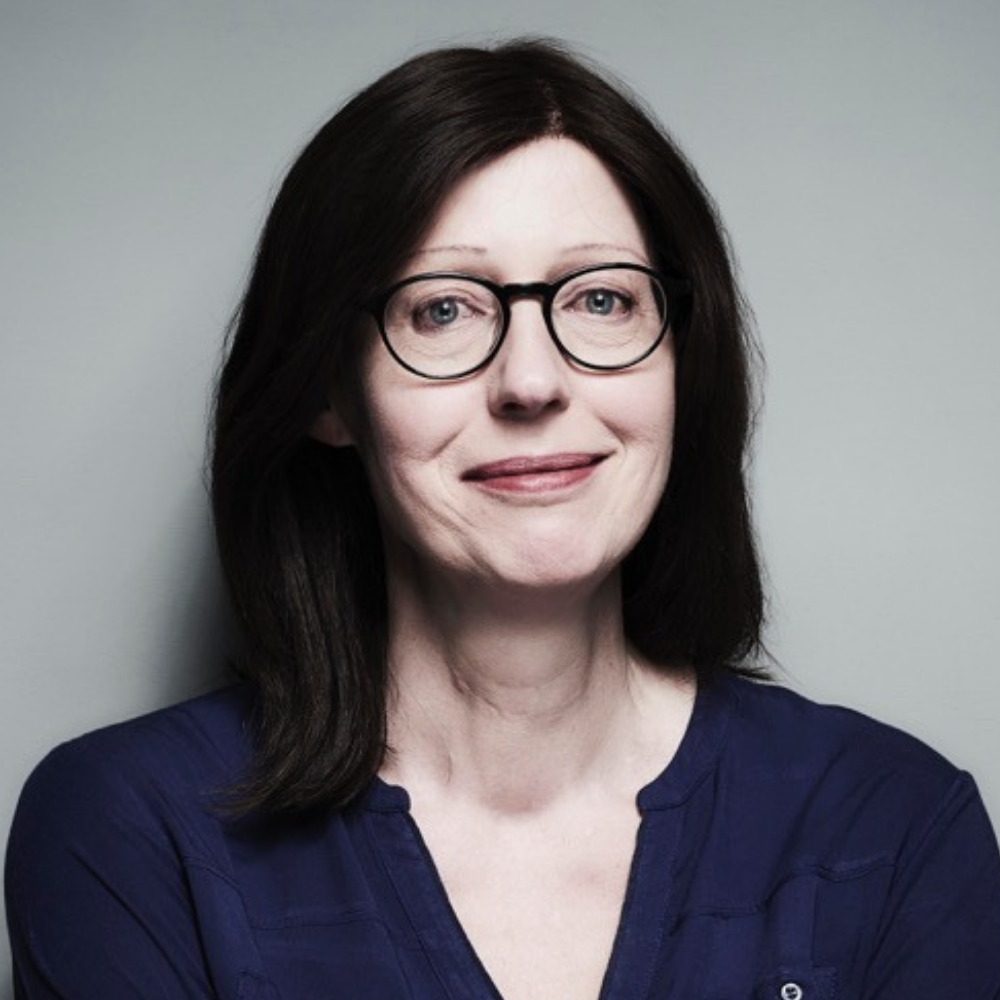
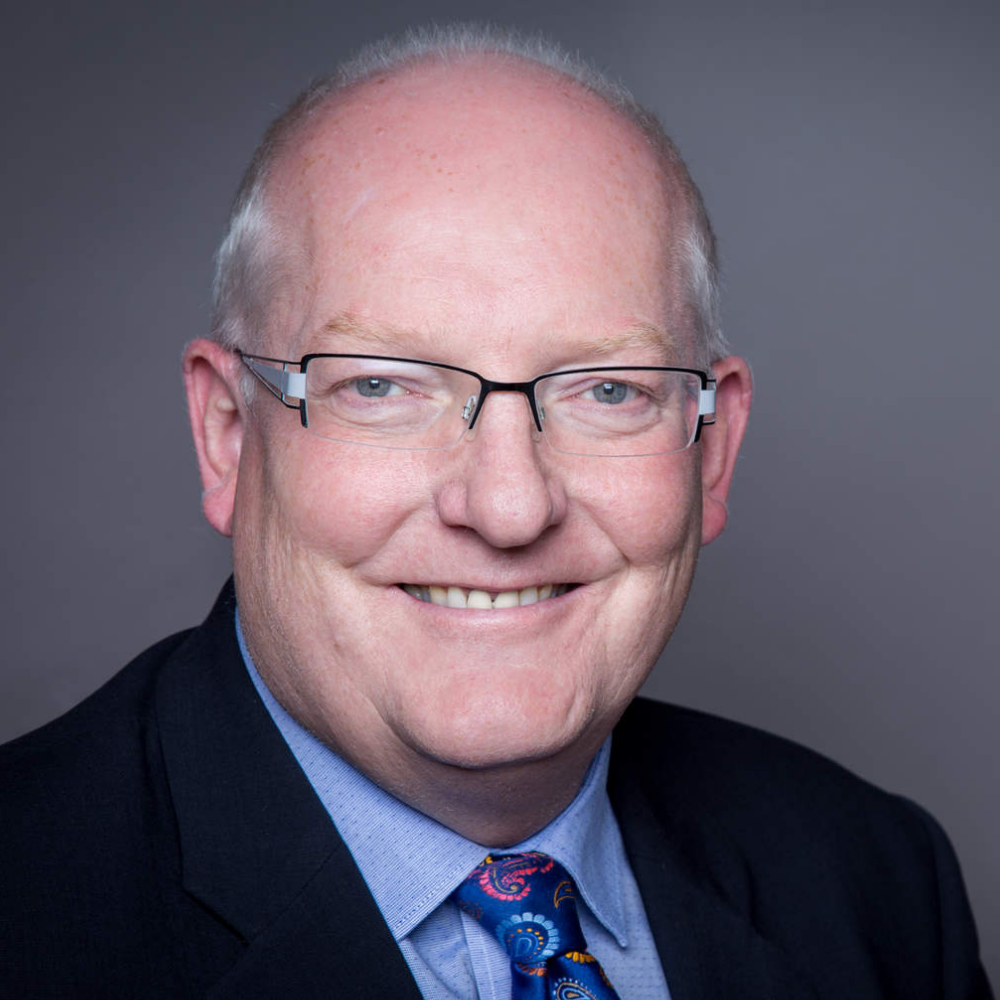
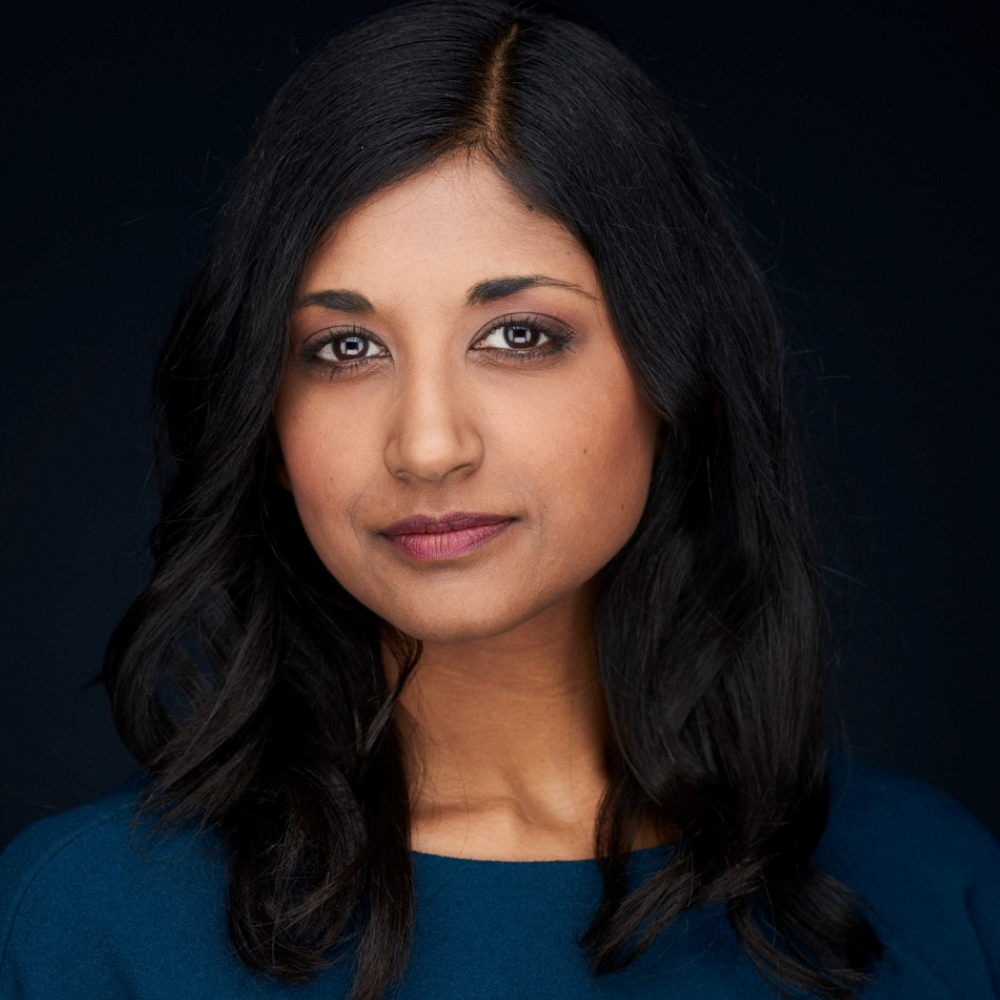
- Opening remarks by Dr. Claudia Huber, Steering Committee Member, New Urban Progress & Head of Europe Programme, Alfred Herrhausen Gesellschaft
- Closing statement from Crystal Swann, Progressive Policy Institute, Steering Committee Member of New Urban Progress
New Urban Progress is the joint metro initiative of Das Progressive Zentrum, the Alfred Herrhausen Gesellschaft and the Progressive Policy Institute.
The project is supported by the Transatlantic Program of the Federal Republic of Germany and funded by the European Recovery Program (ERP) of the Federal Ministry of Economics and Energy (BMWi).

